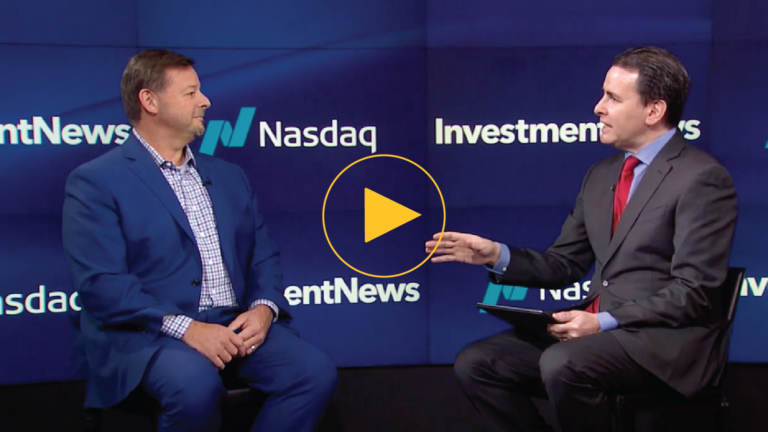
InvestmentNews: Overloading on stocks in retirement often makes sense
Chief Investment Officer Scott Ladner joins Gregg Greenberg with InvestmentNews to share how Horizon’s goals-based
Intuitive technology that supports your advisors
Goals-based strategies managed by Horizon Investments
Our latest thoughts, in and on the media
Our regular look at the market’s most revealing number
Our in-depth thinking on goals-based investing
What we do—and why we do it
What we do—and why we do it
Topics

Chief Investment Officer Scott Ladner joins Gregg Greenberg with InvestmentNews to share how Horizon’s goals-based

Middle East conflicts shouldn’t derail the strong domestic growth story. Rising Middle East tensions caused oil prices to briefly spike last week before reversing course

What happened last week Equities fell for the third consecutive week as rates continued to climb higher. Strong retail sales print supported the trend of
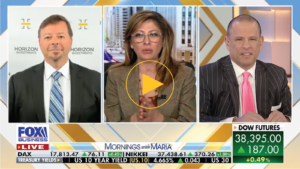
Chief Investment Officer Scott Ladner joins Mornings With Maria on Fox Business to analyze this week’s earnings, recession probability, and Fed decision impacts on inflation.







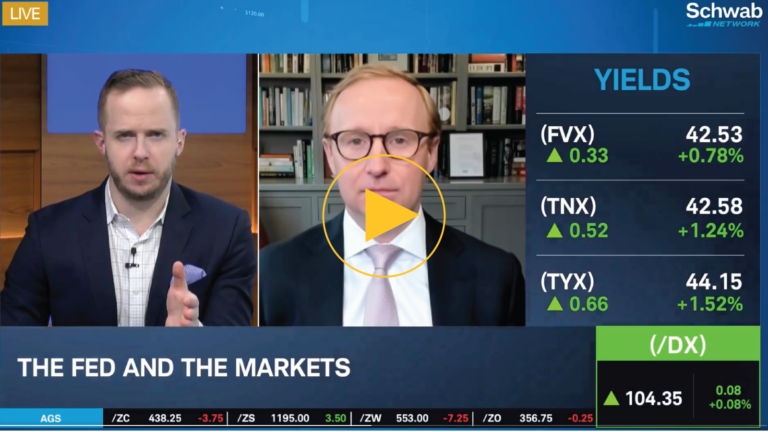






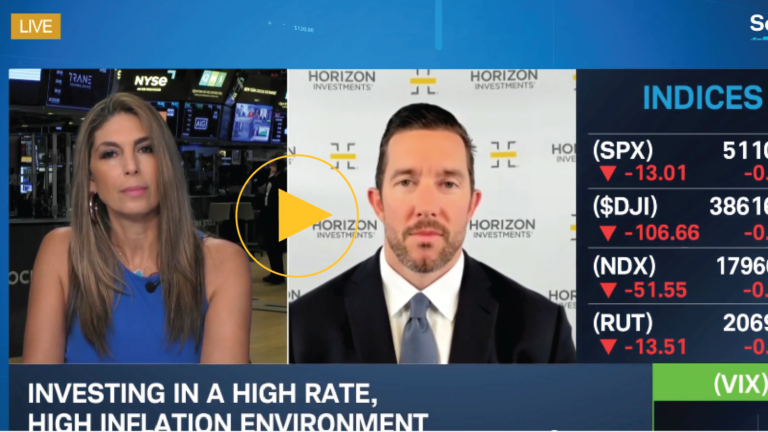

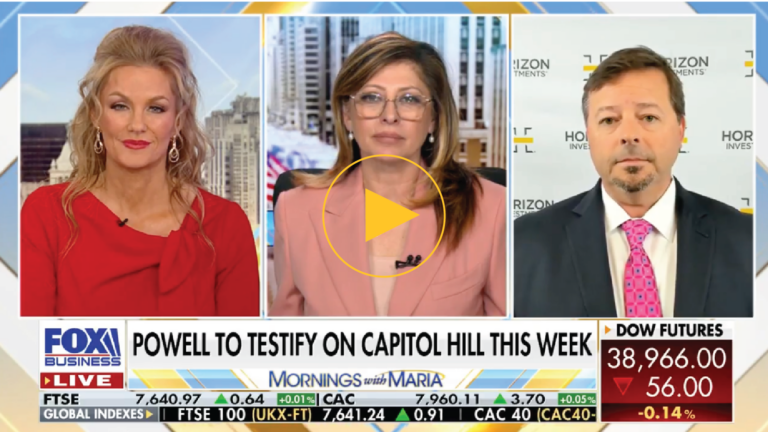
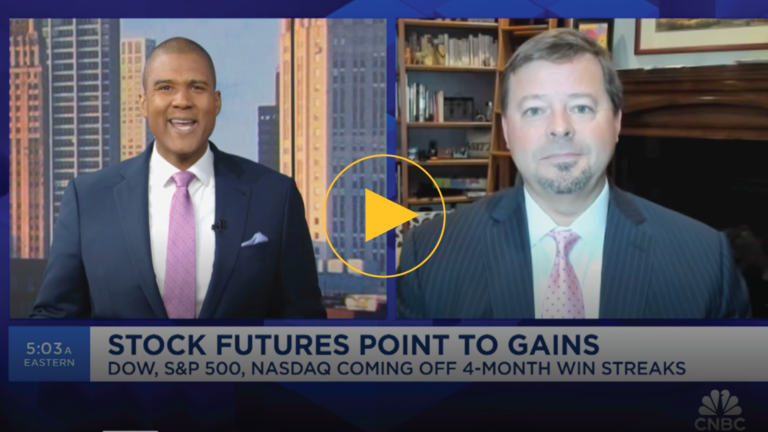








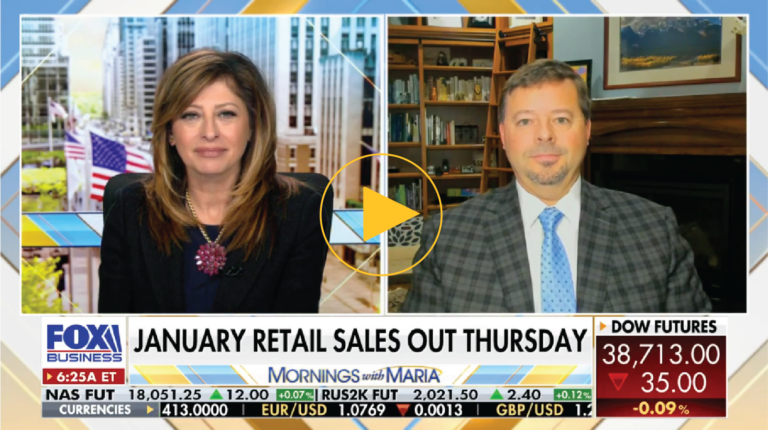







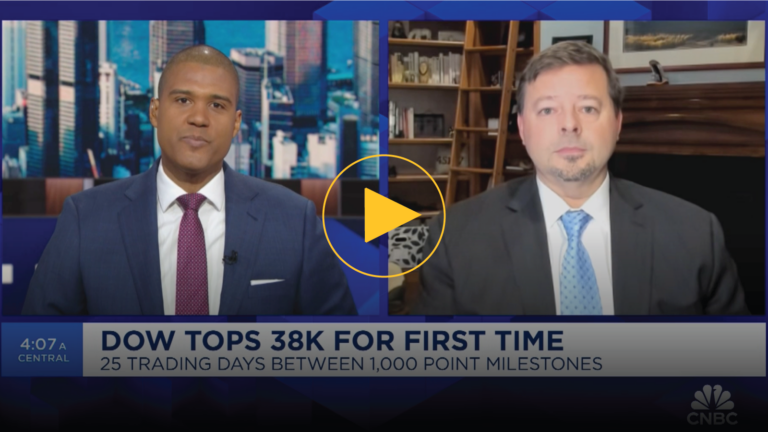
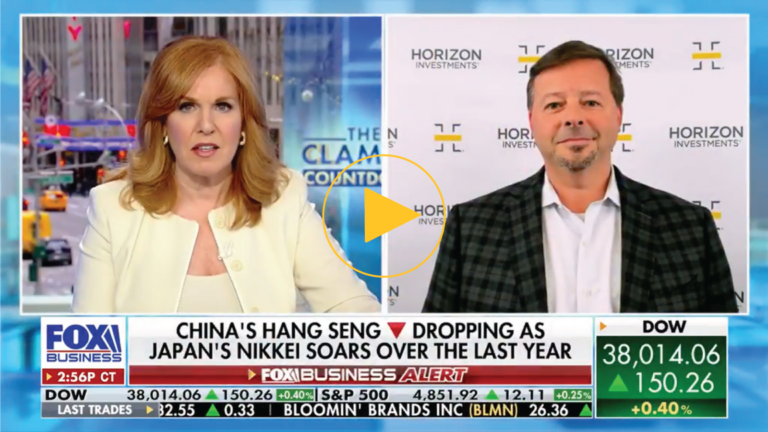
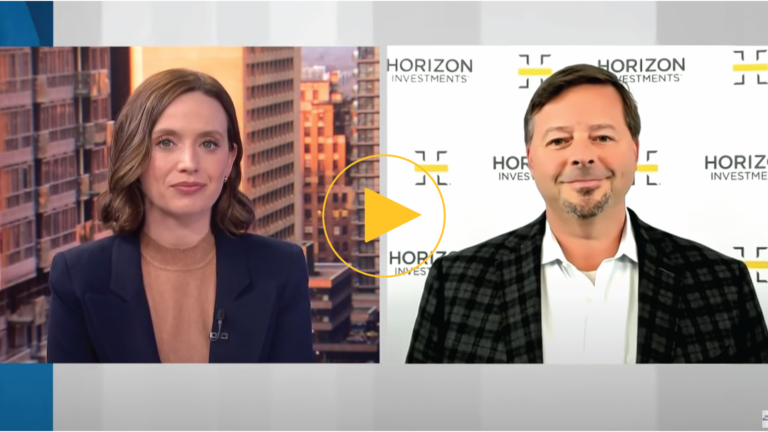


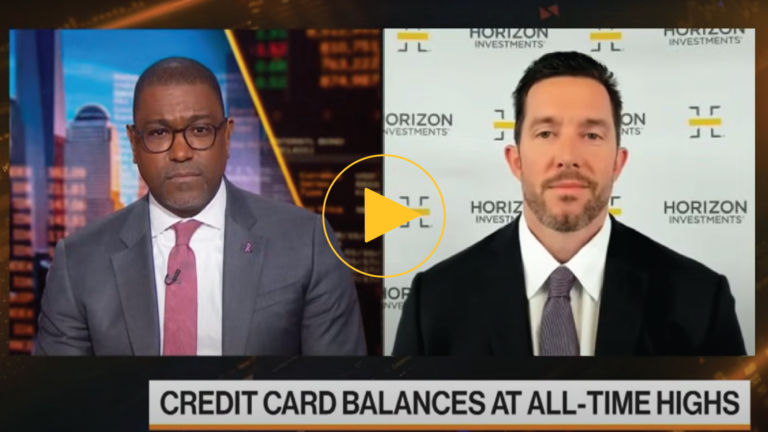




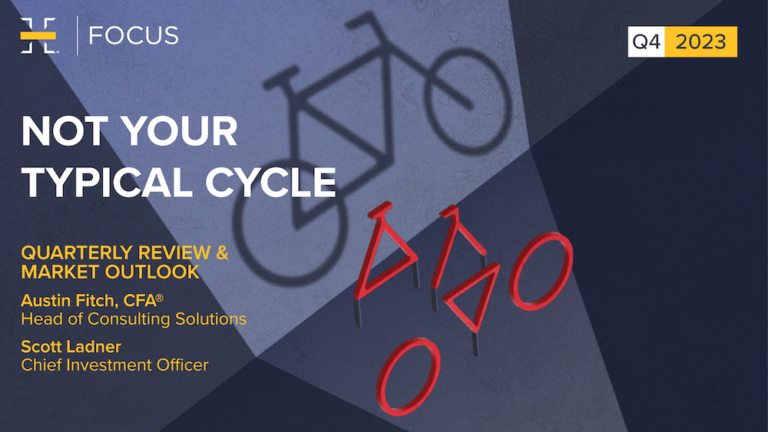

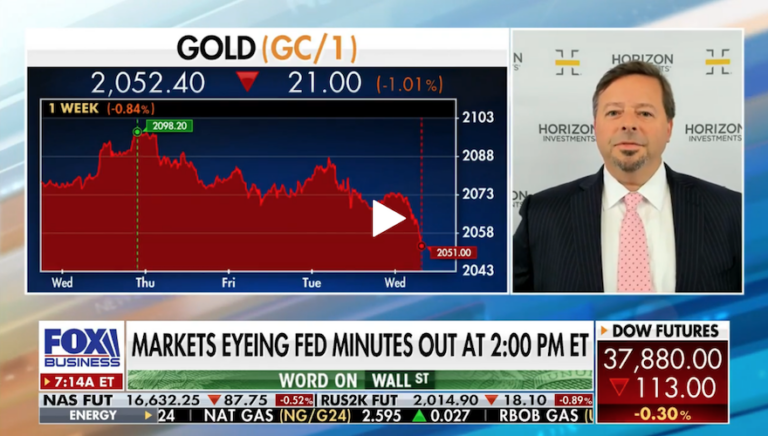








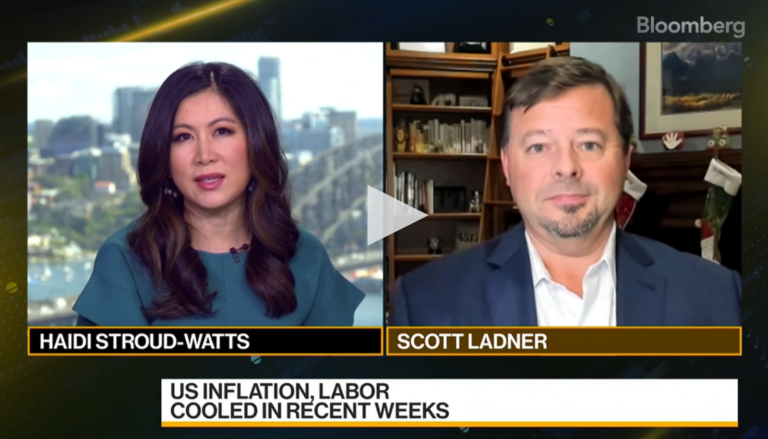



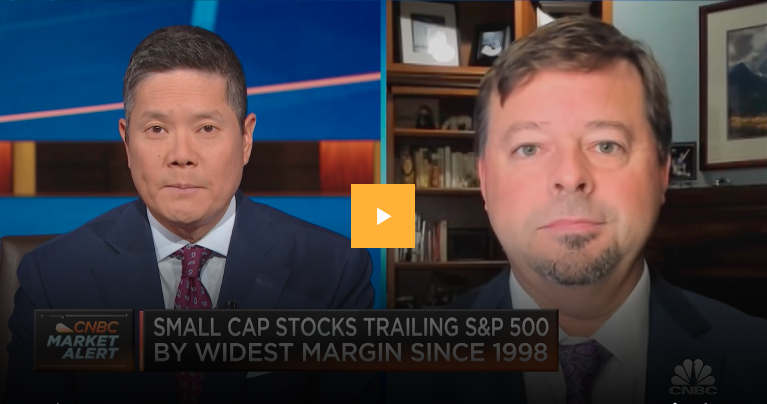

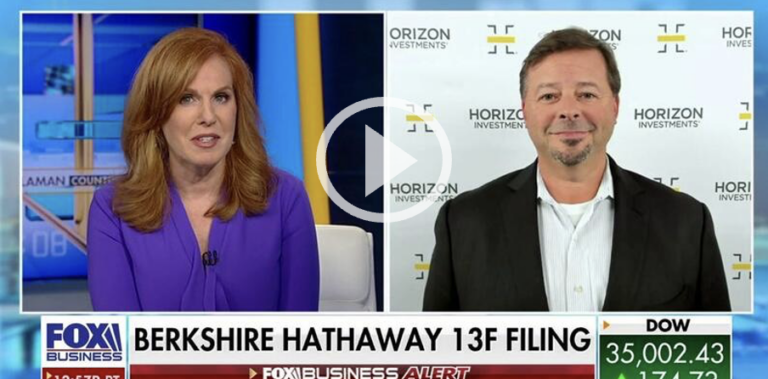
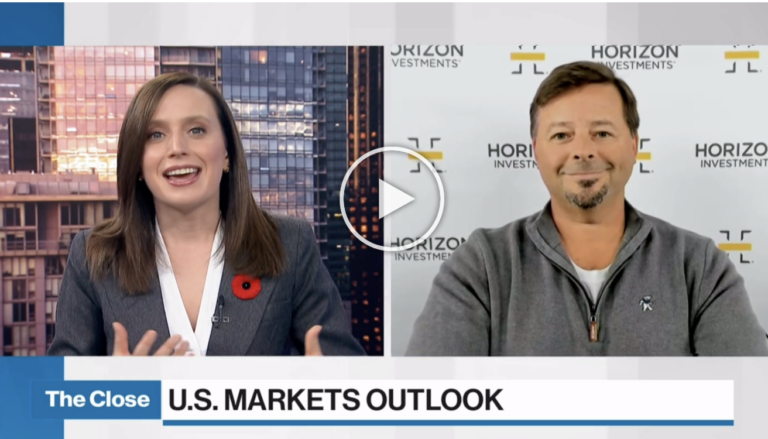



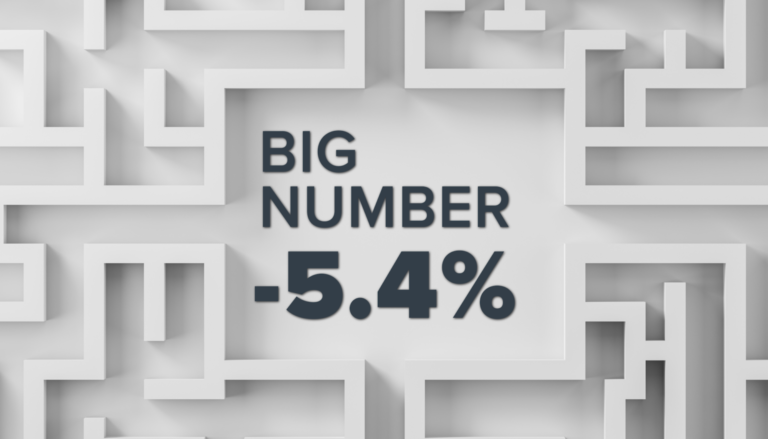






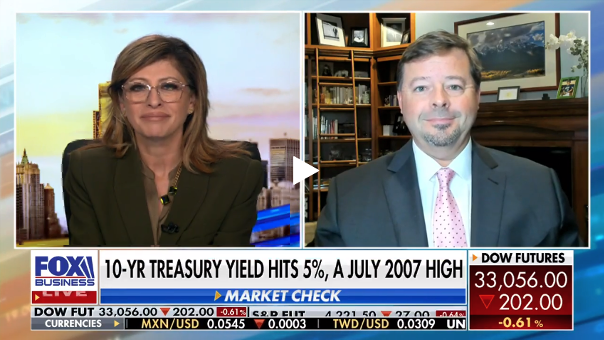


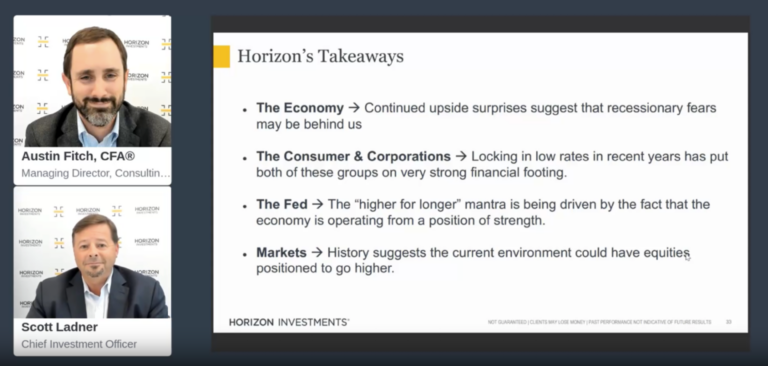
















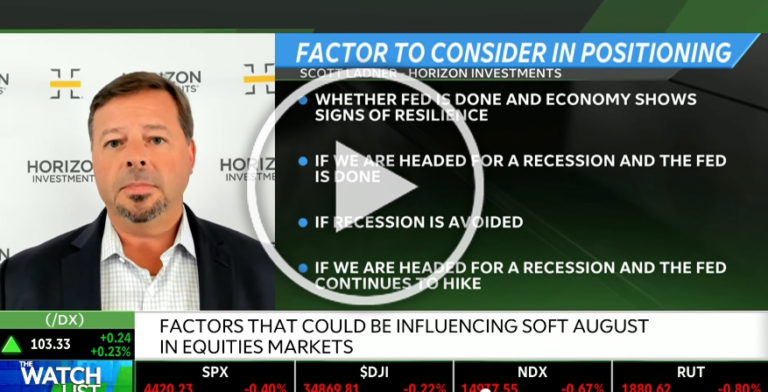



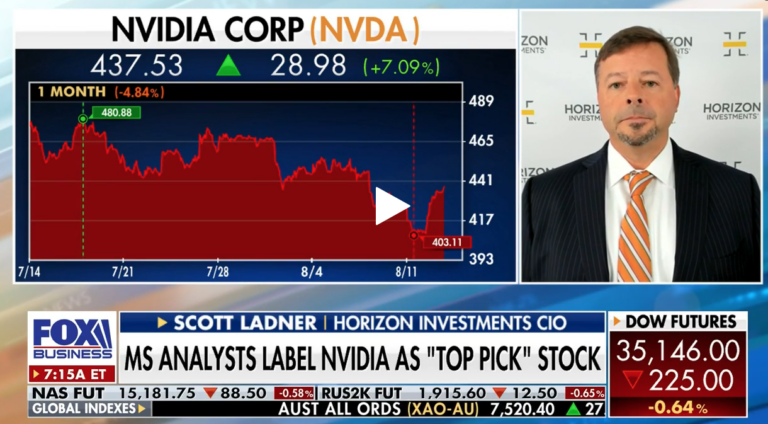








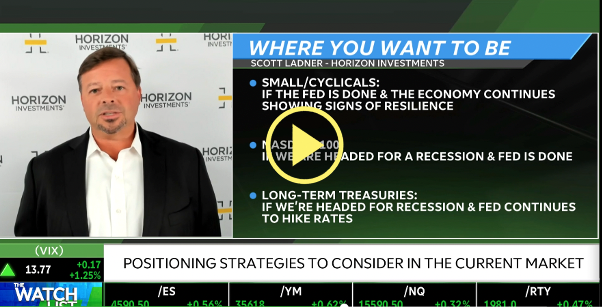

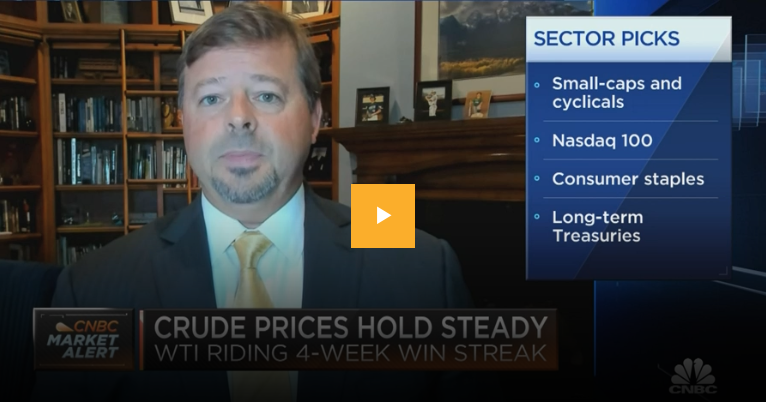



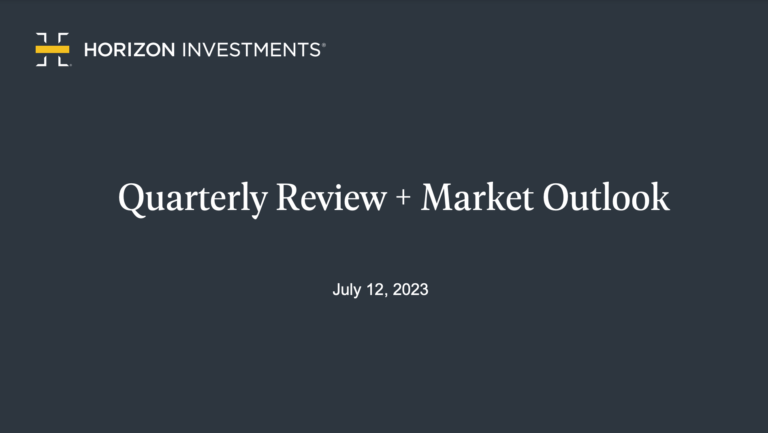




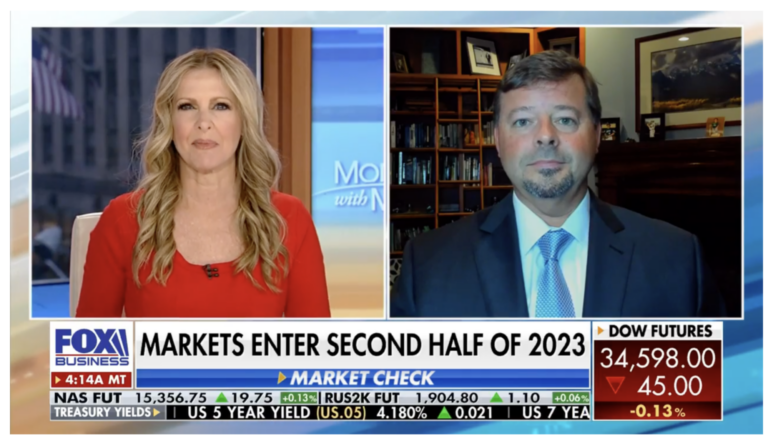



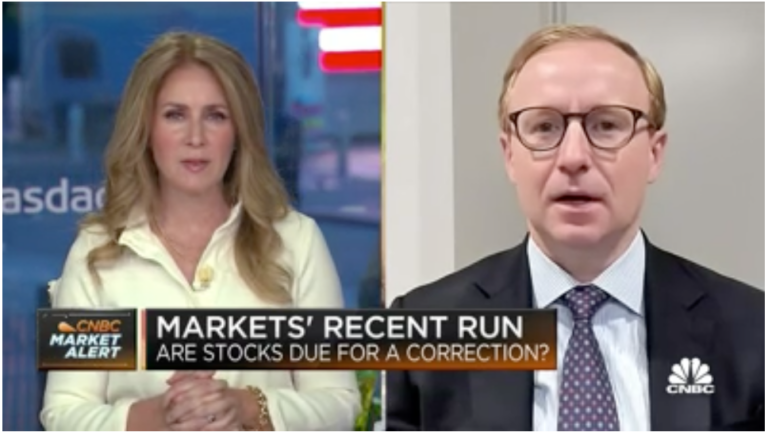


















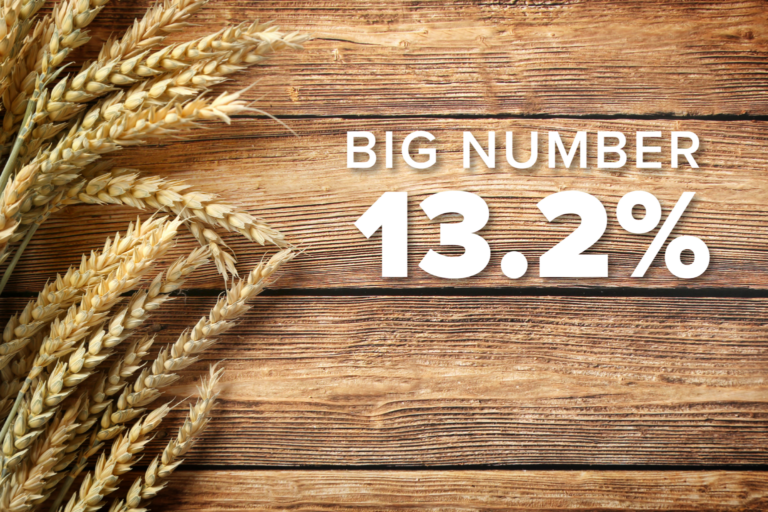


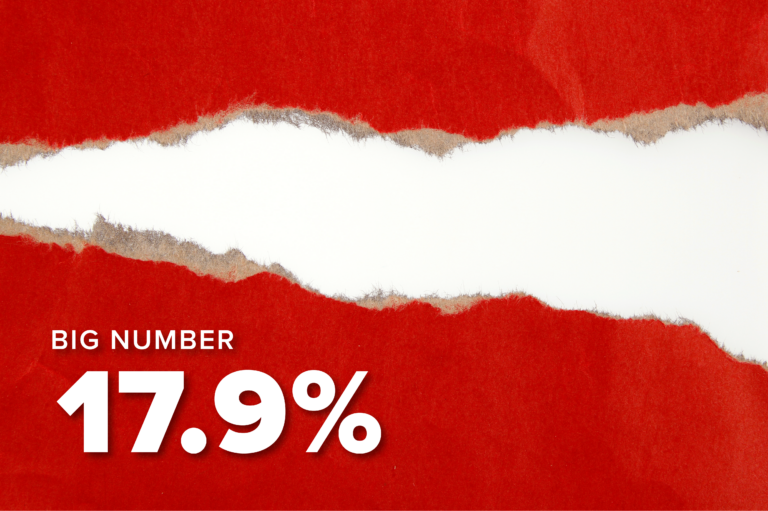







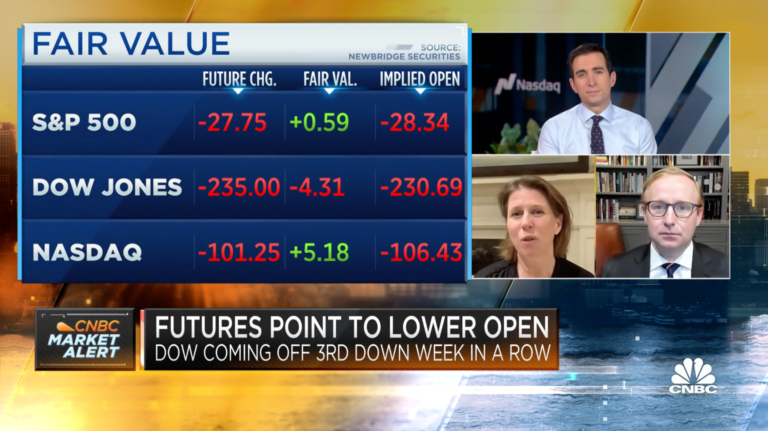










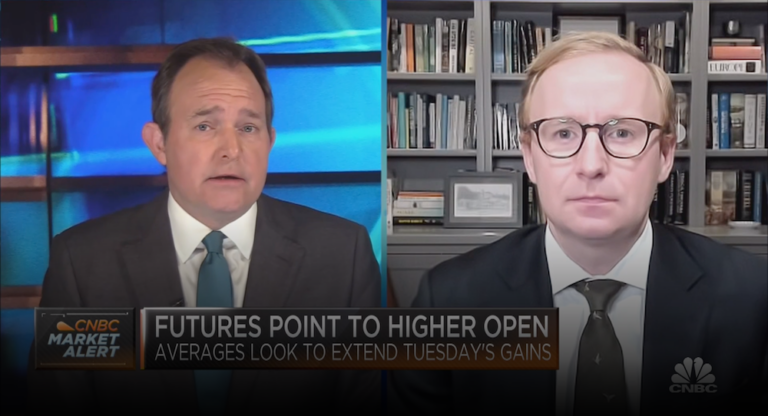


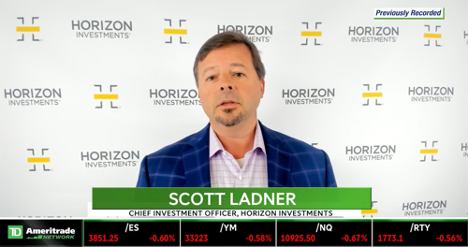
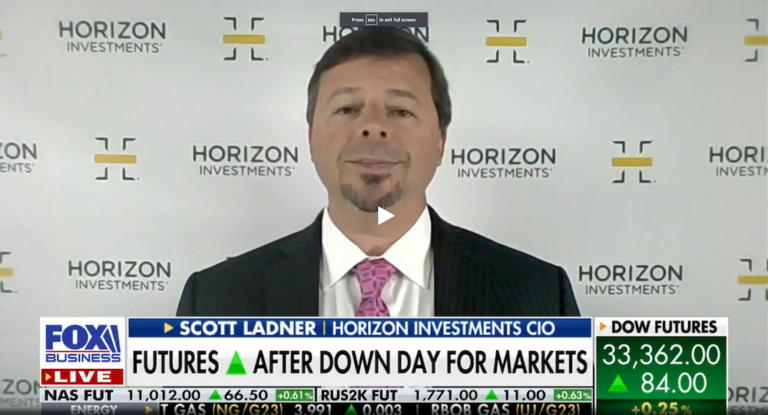
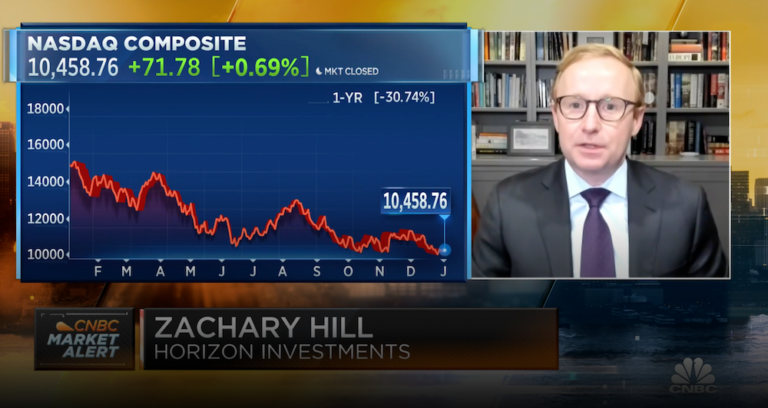

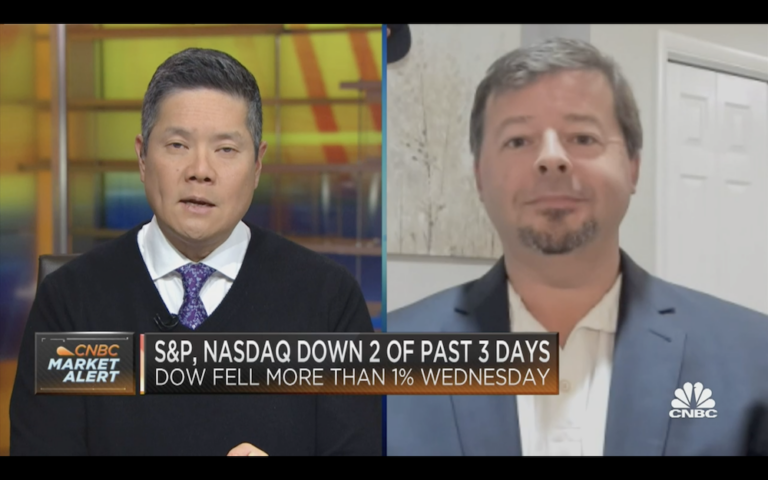


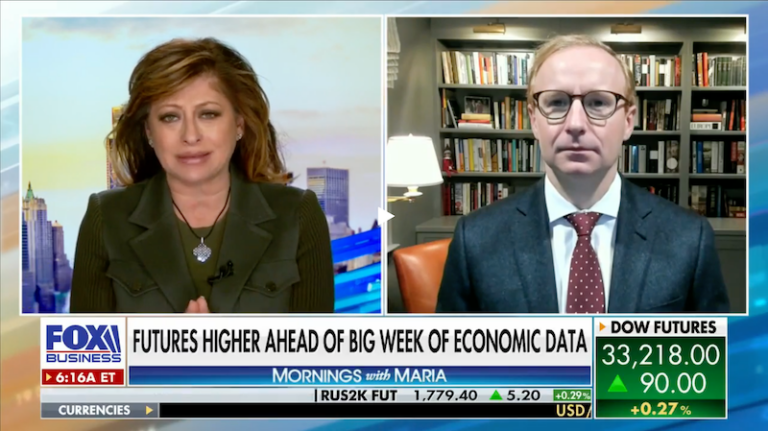


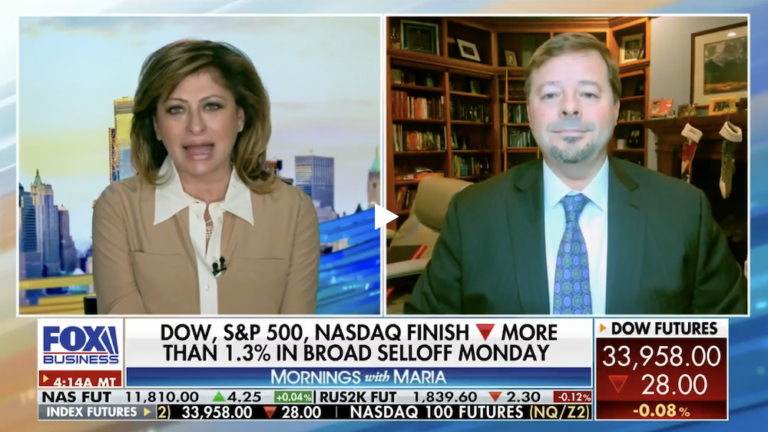
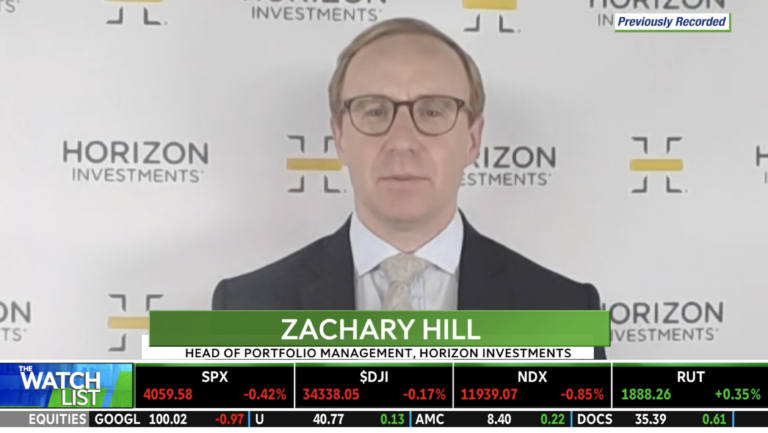

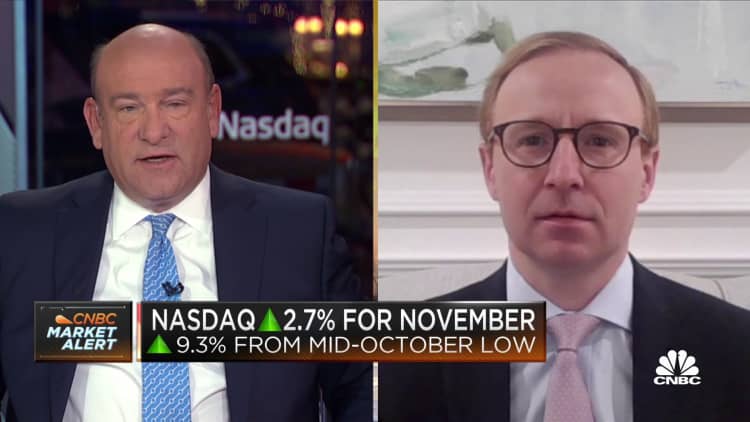





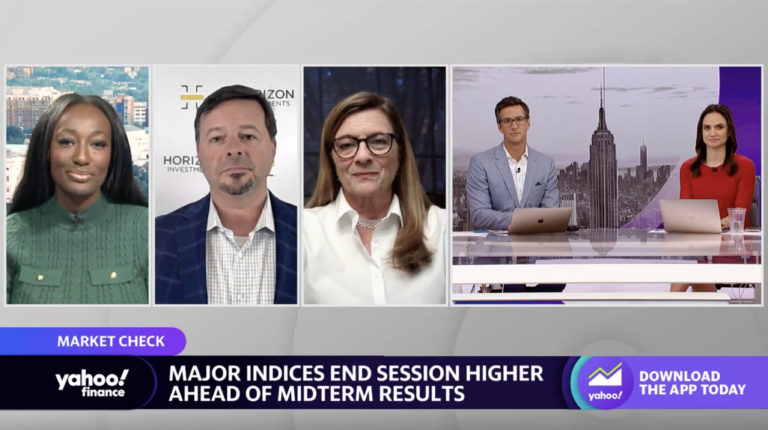

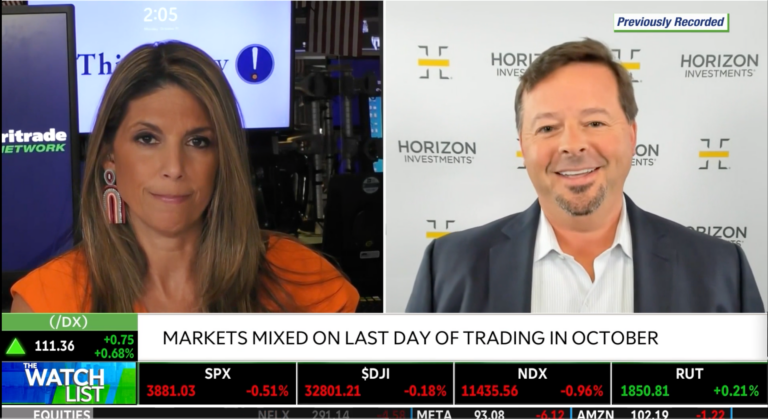


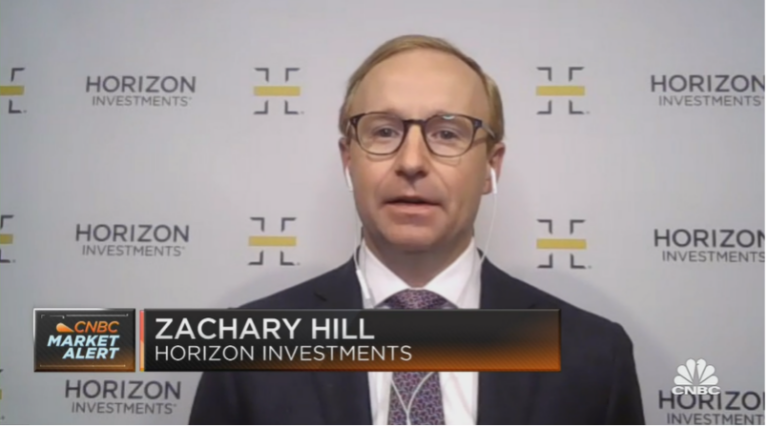
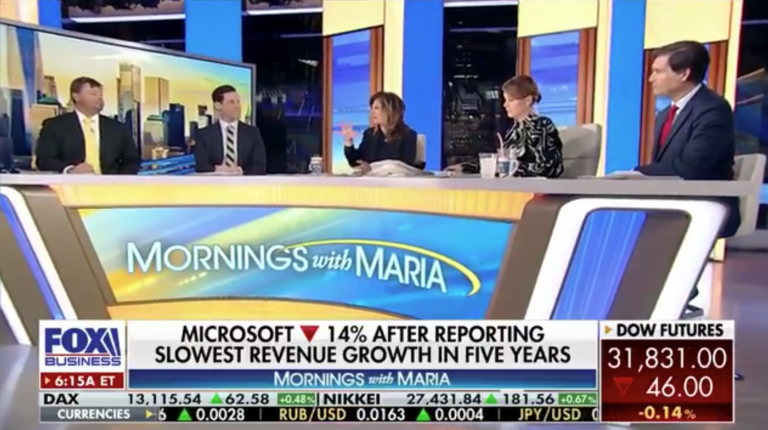
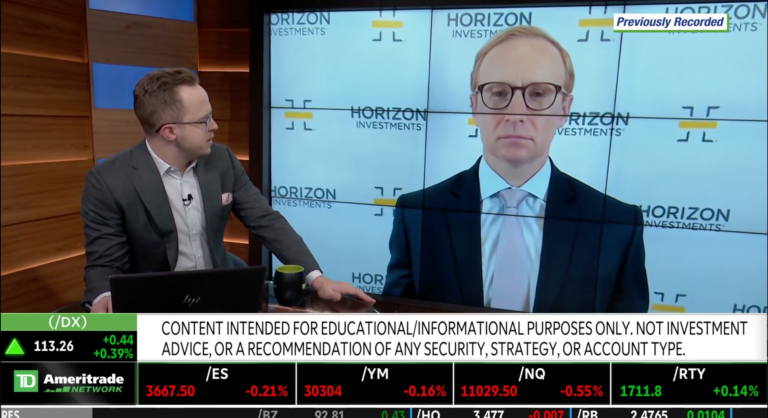
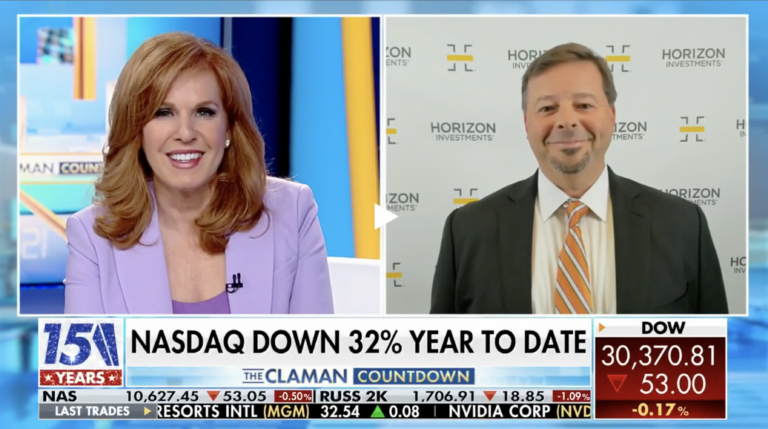


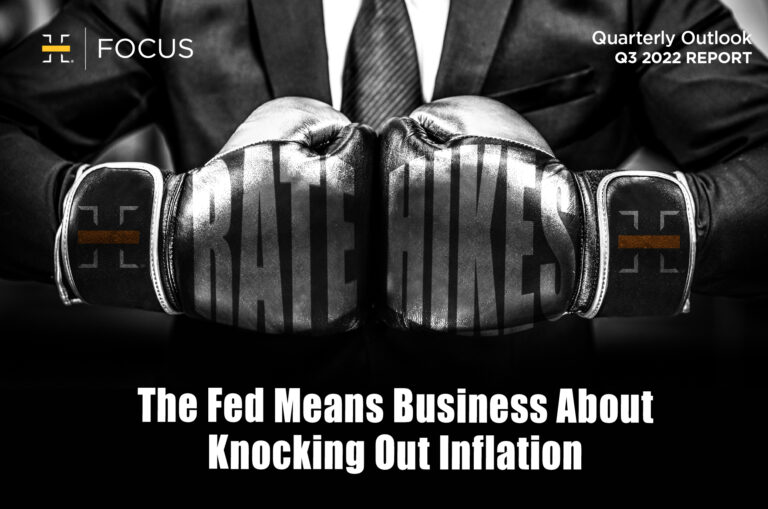


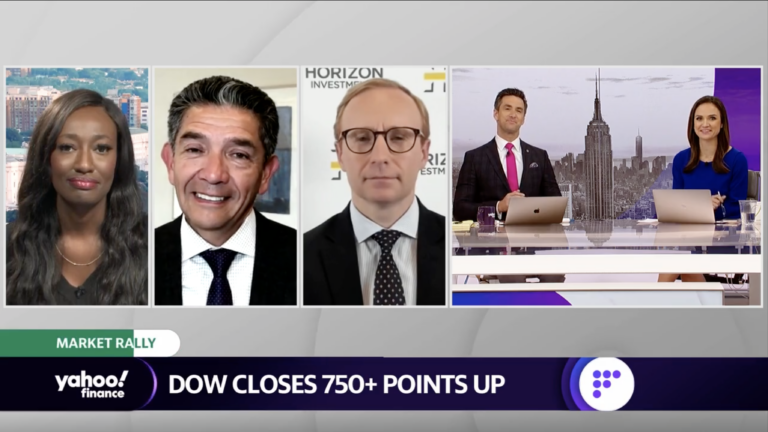
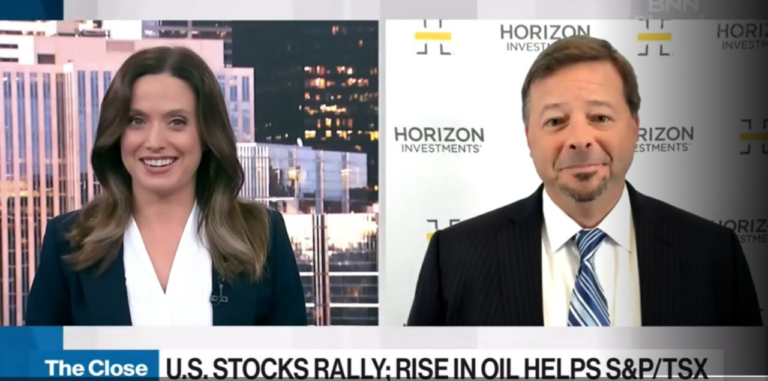
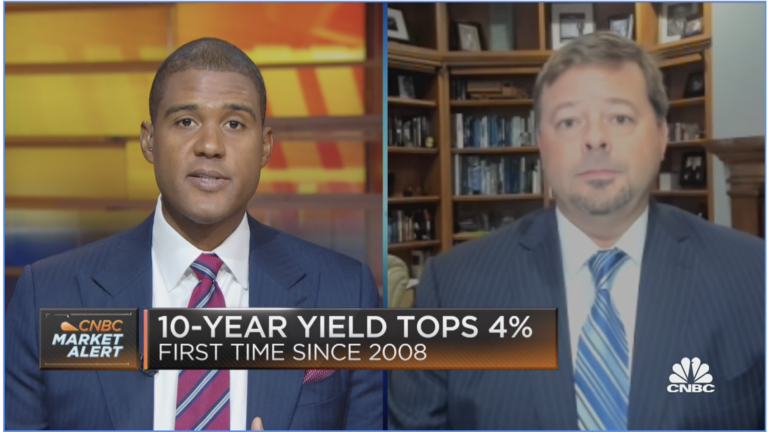

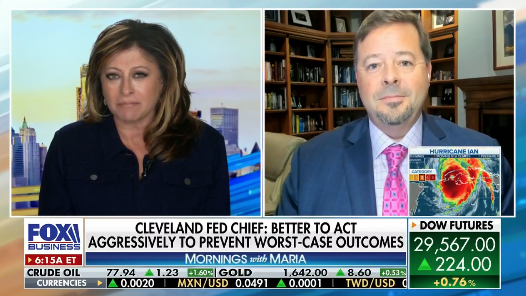
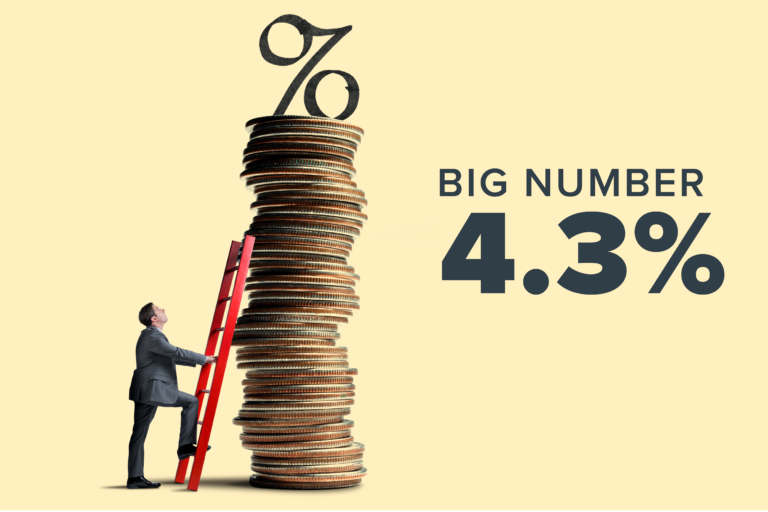
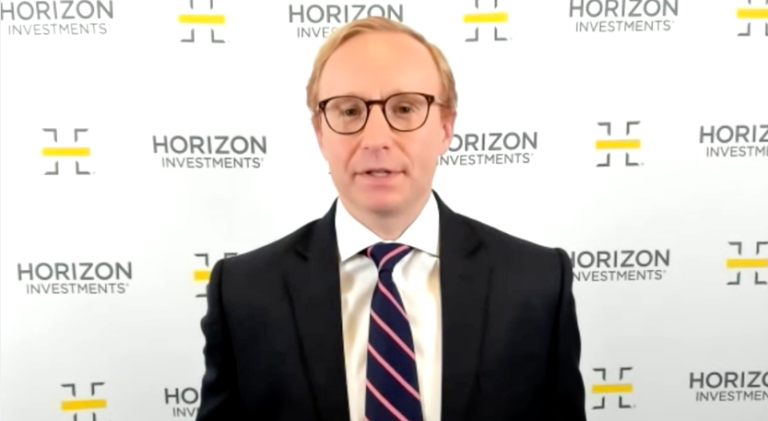
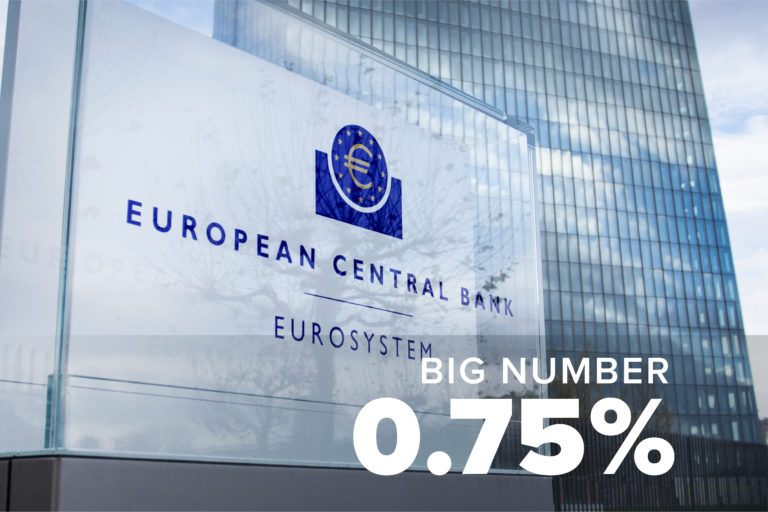
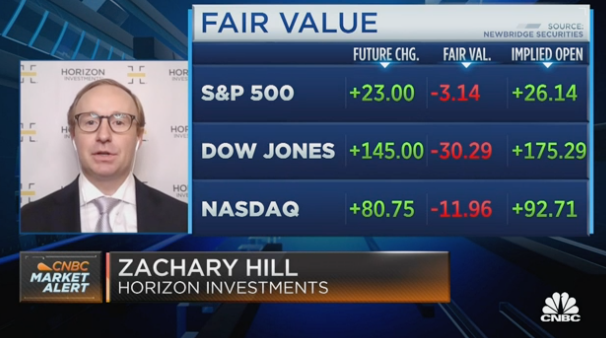

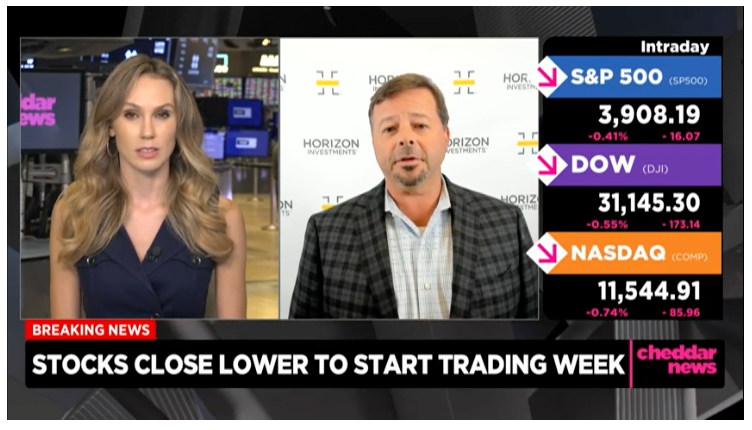
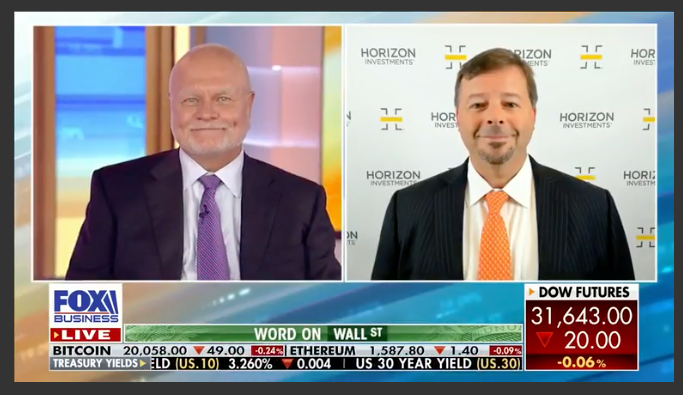
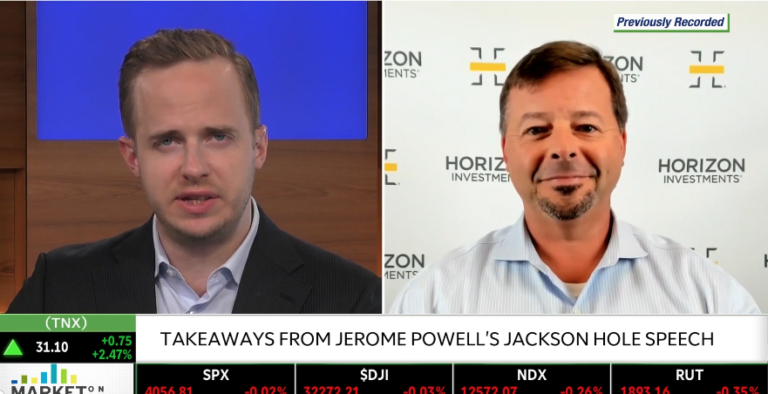



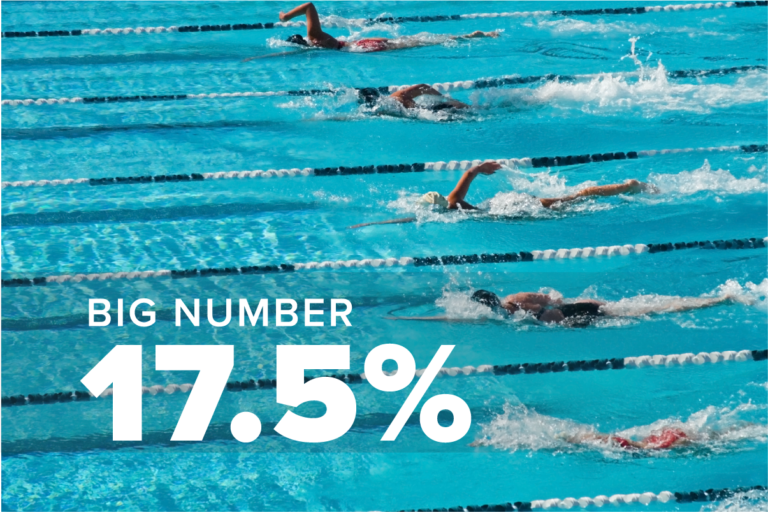



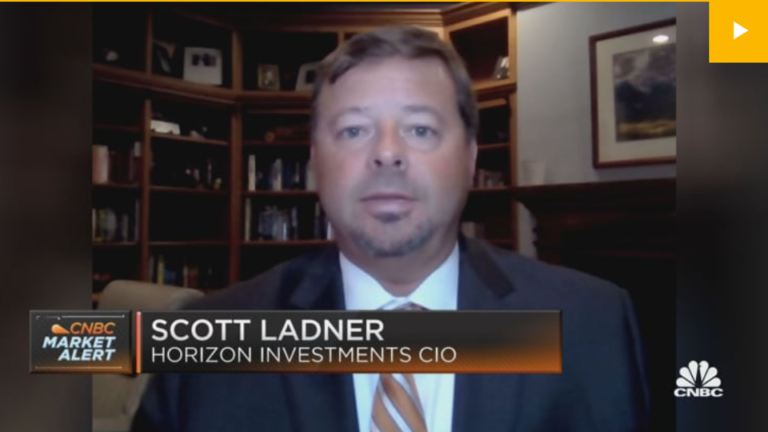


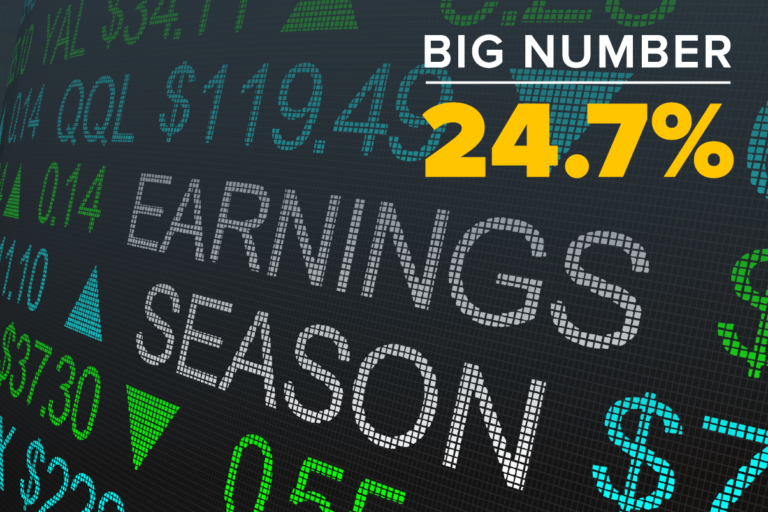


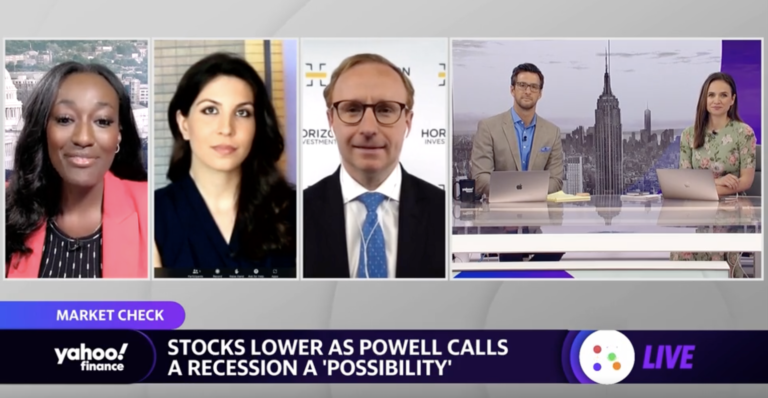


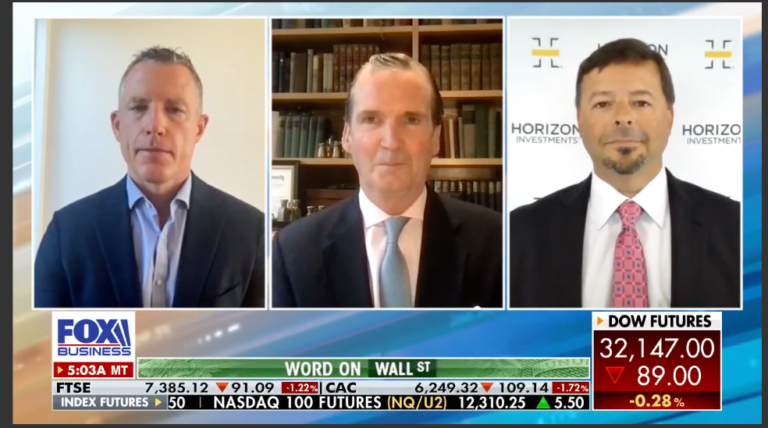

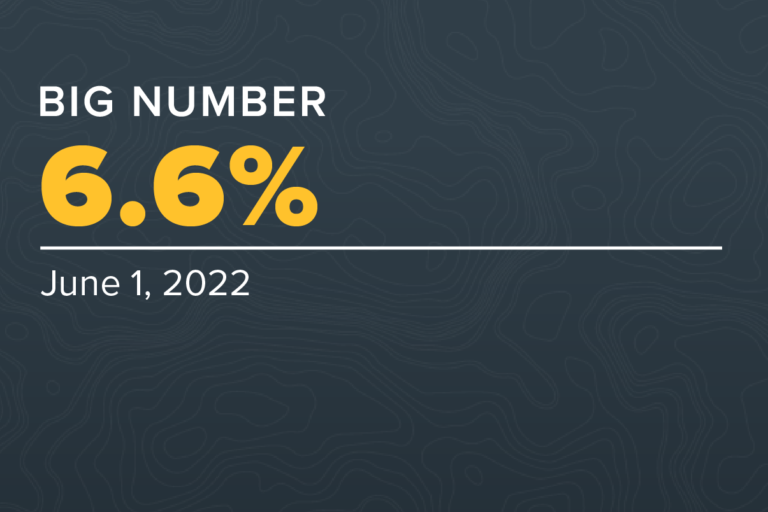
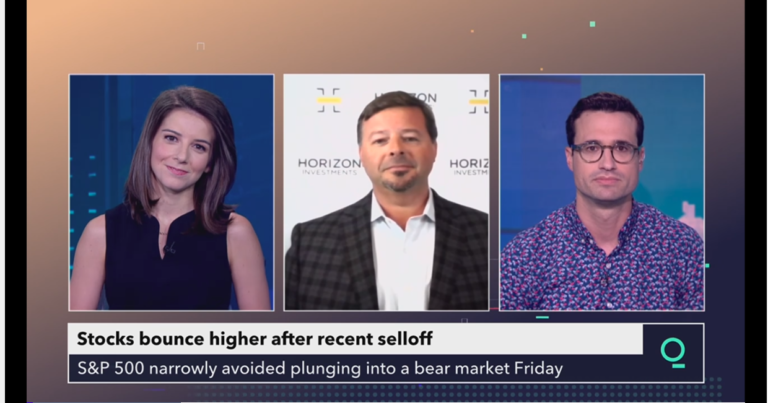
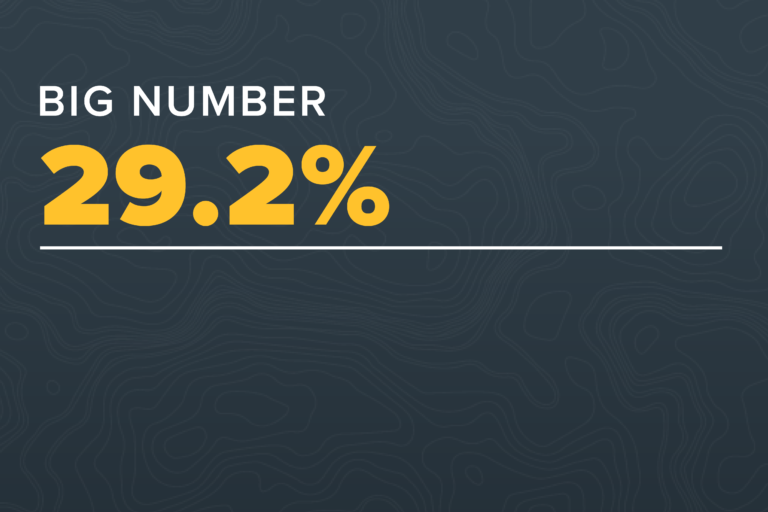

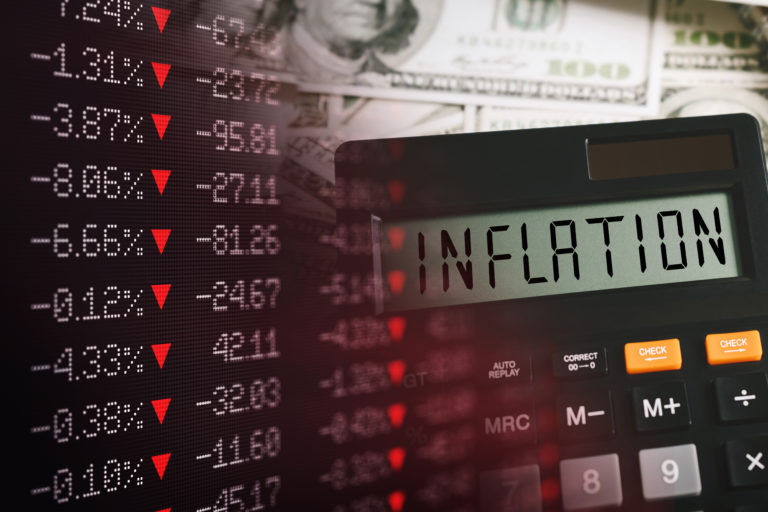
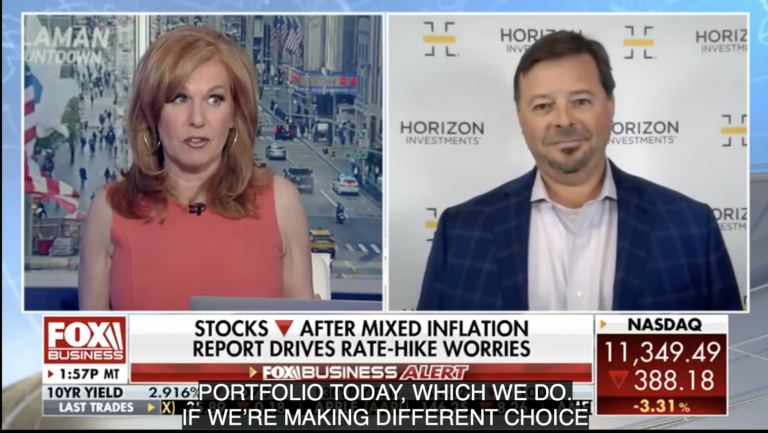
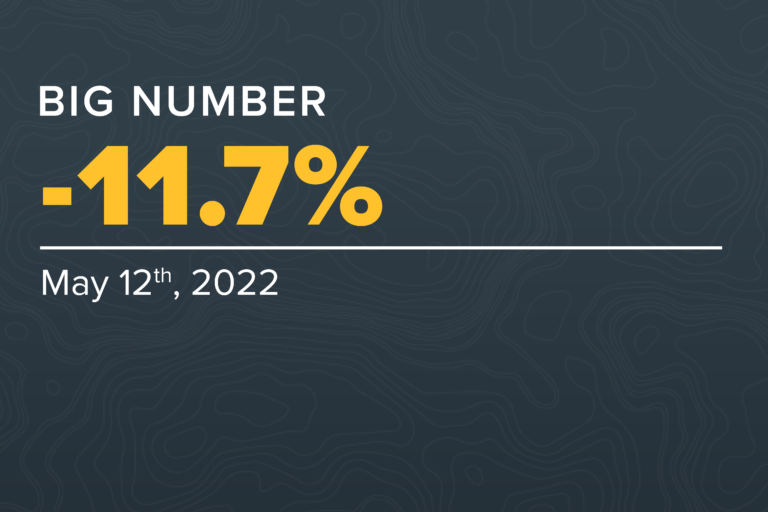


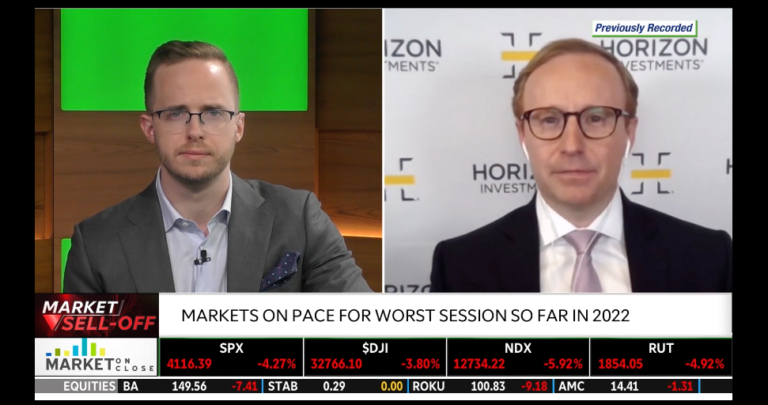


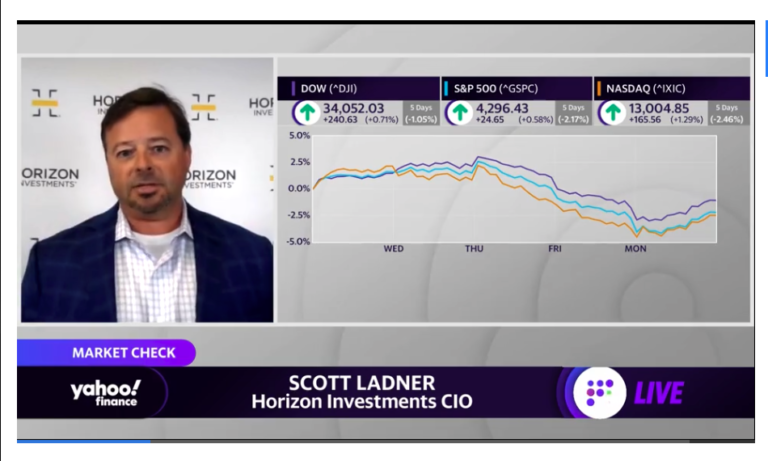

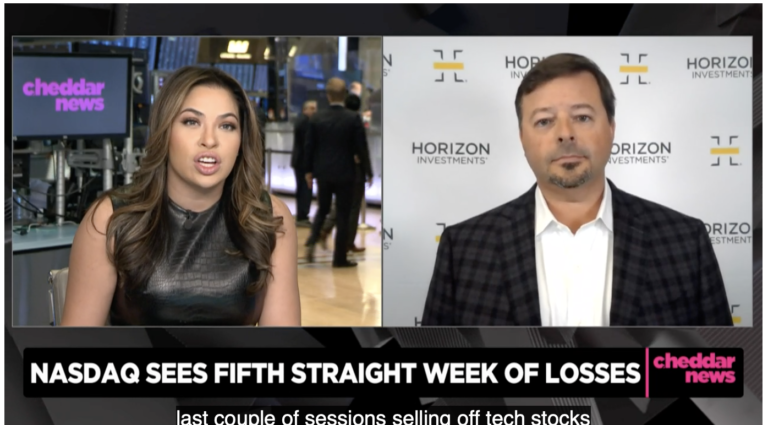











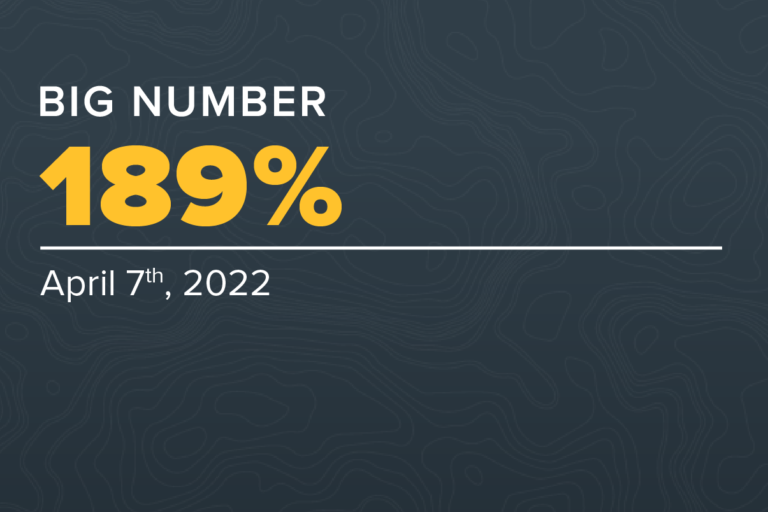
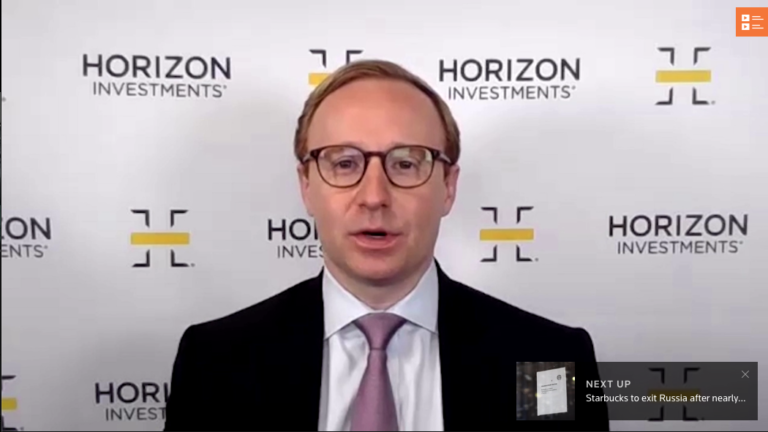
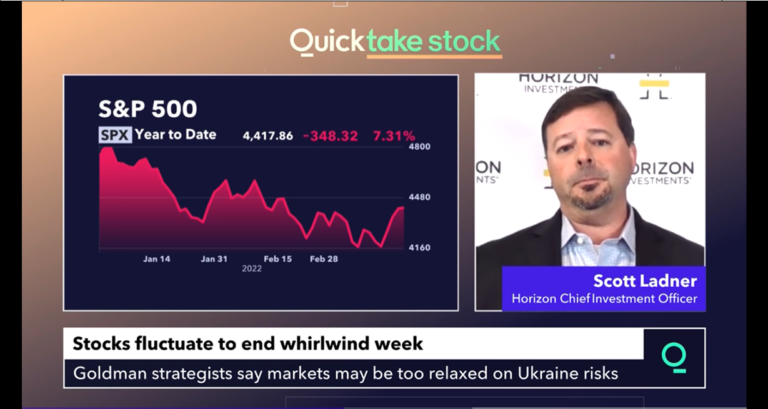


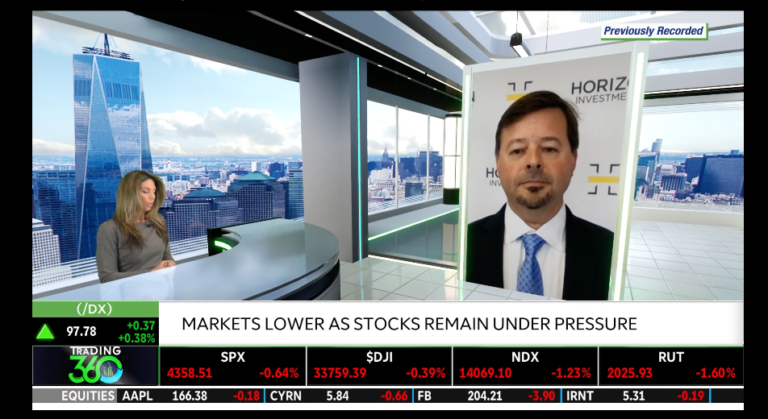
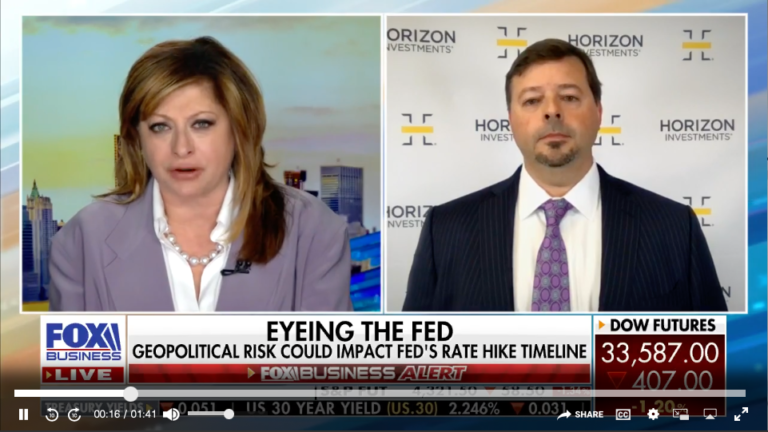

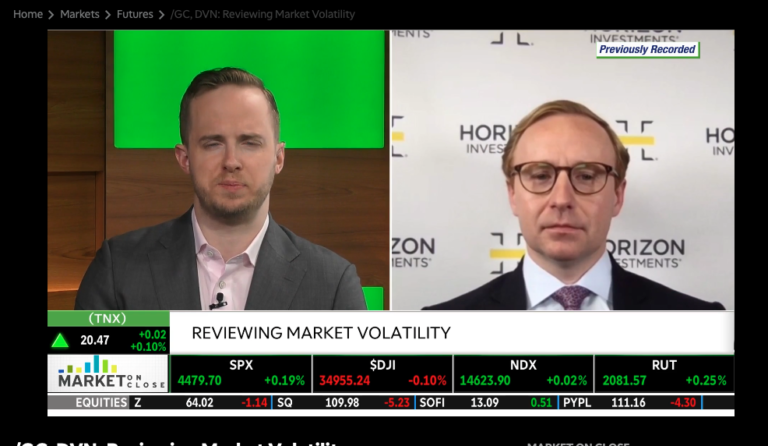
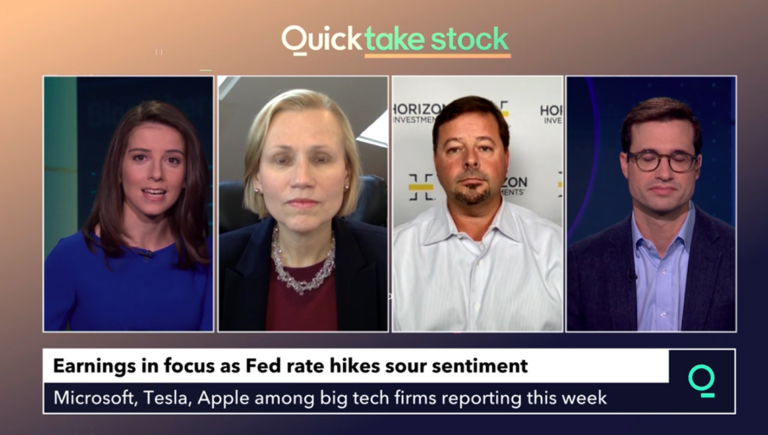
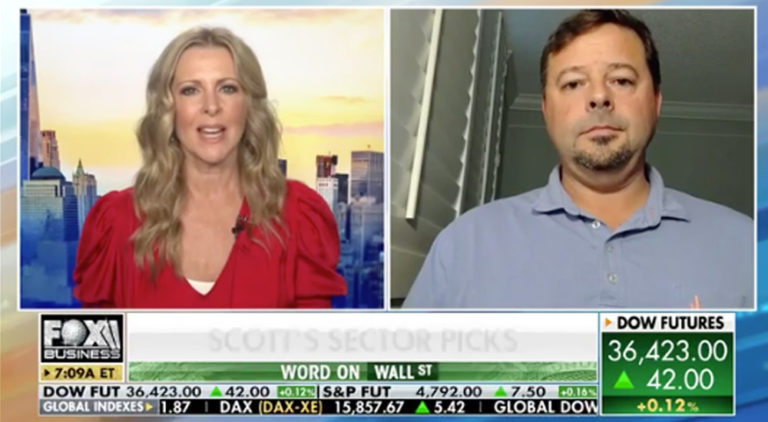

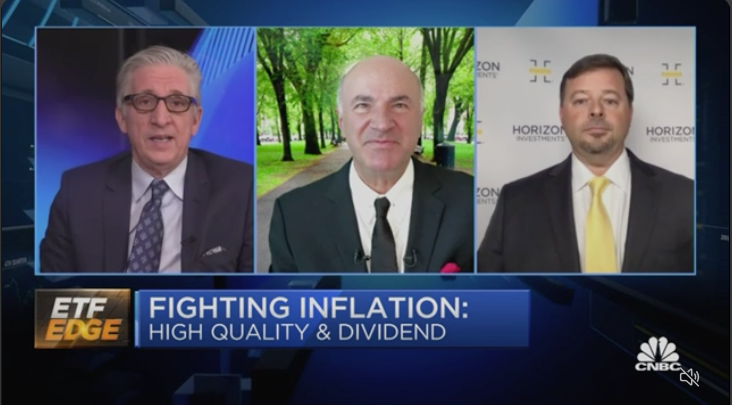
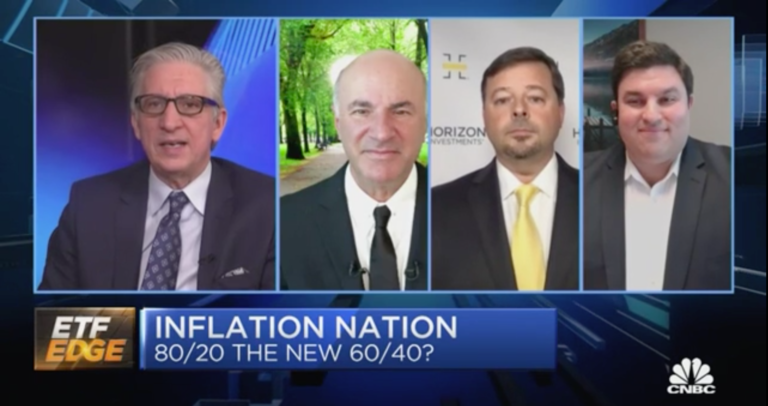
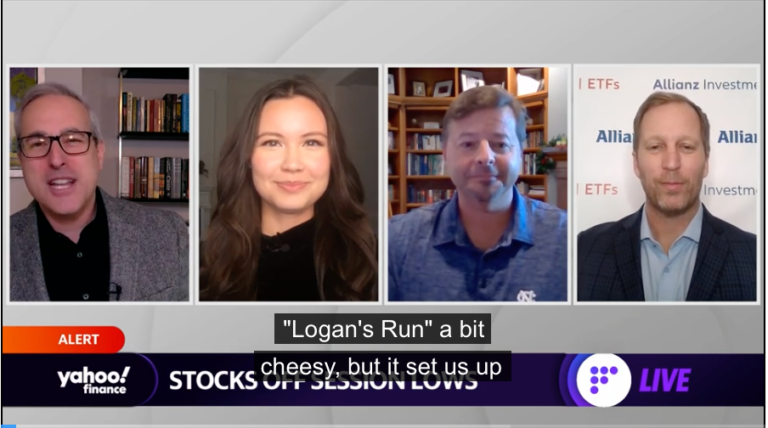
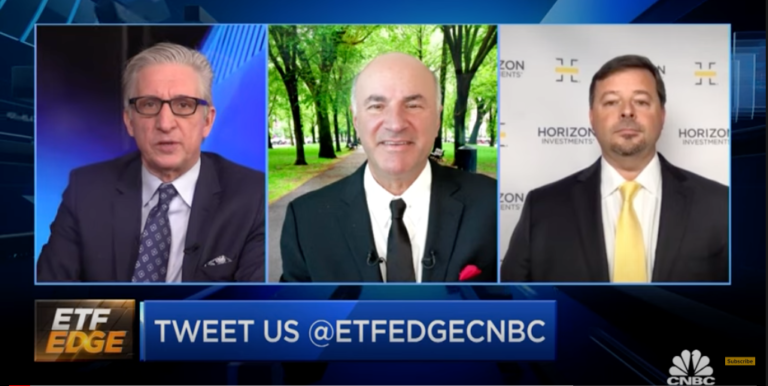

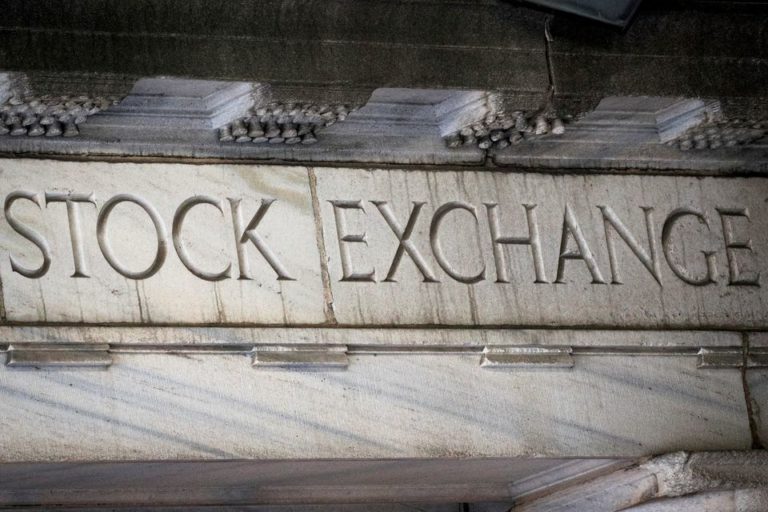

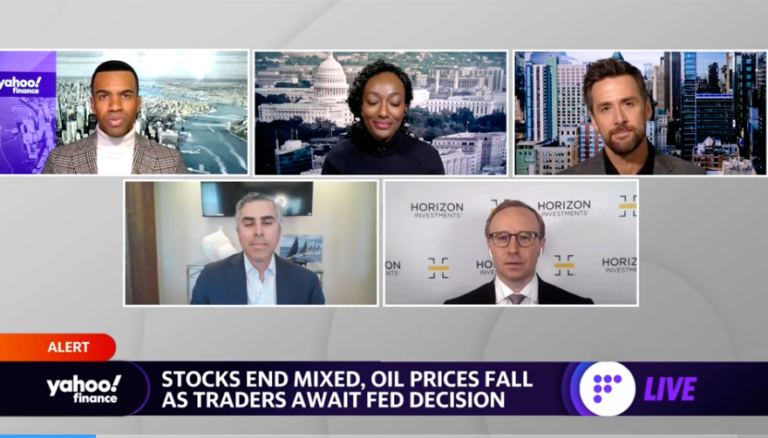






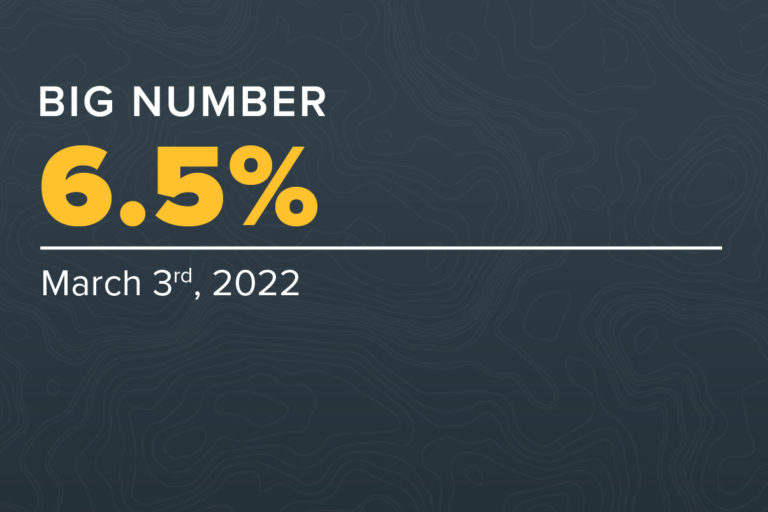

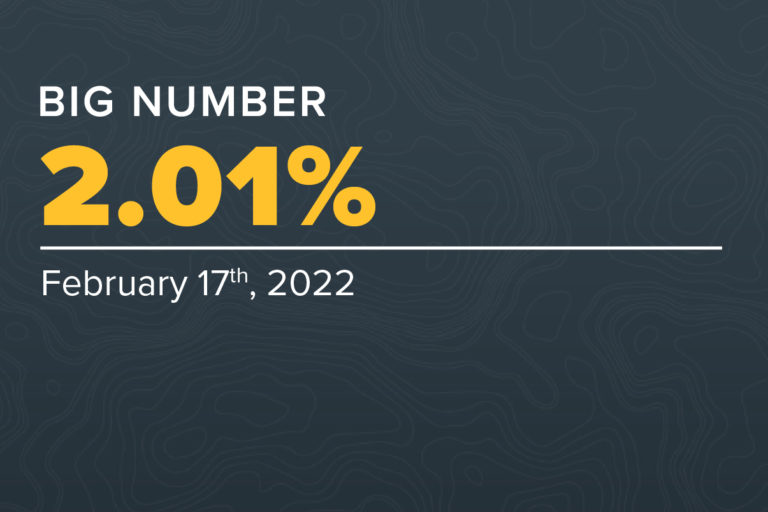



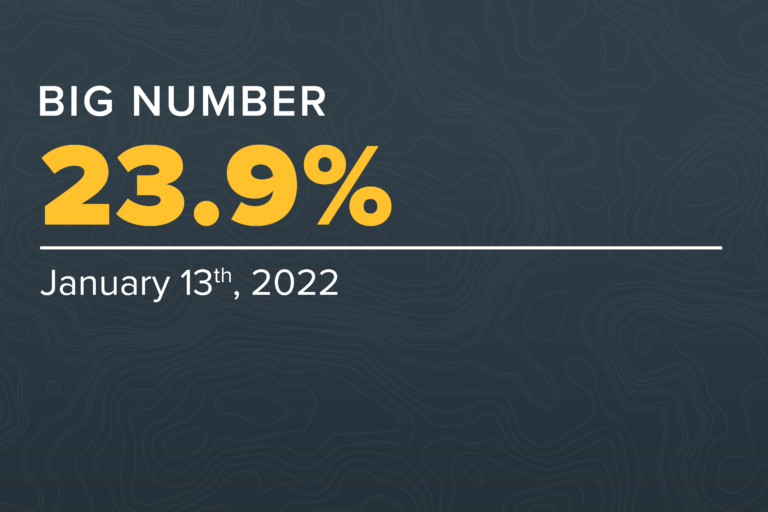

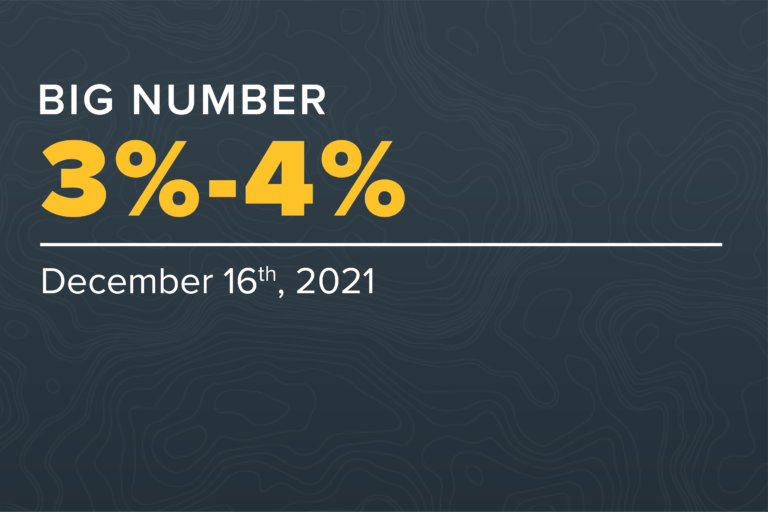




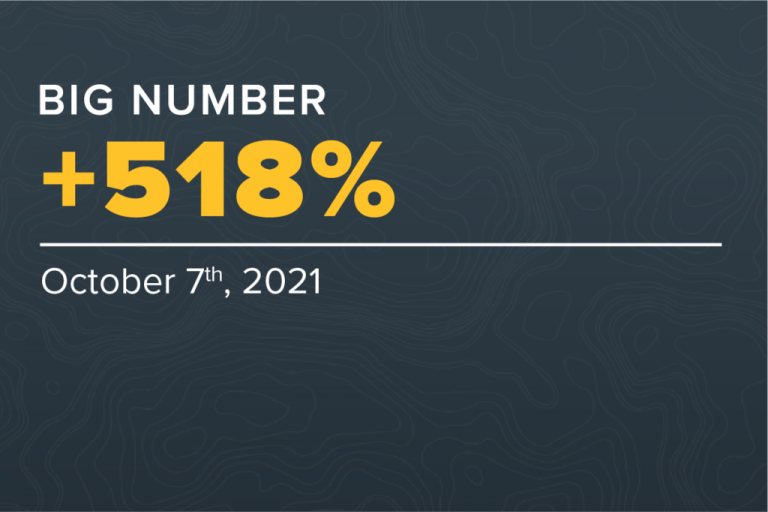














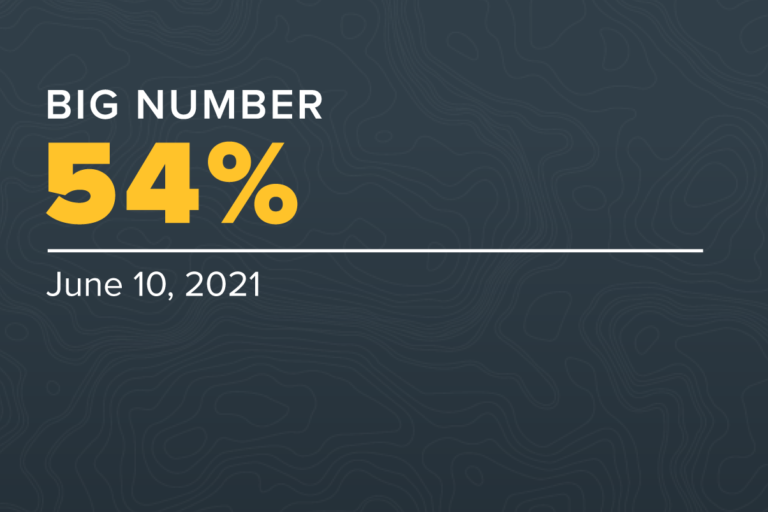
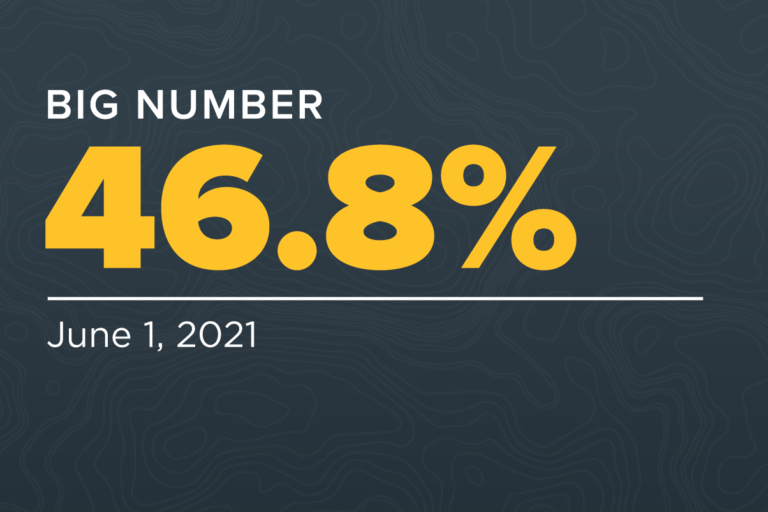
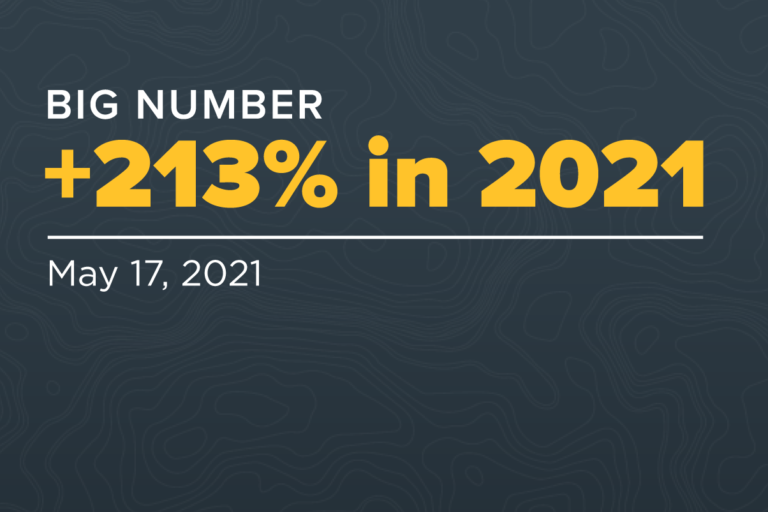
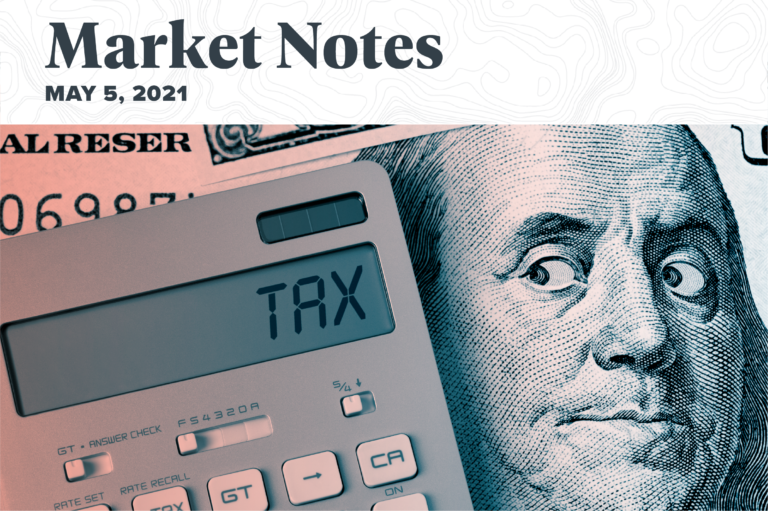



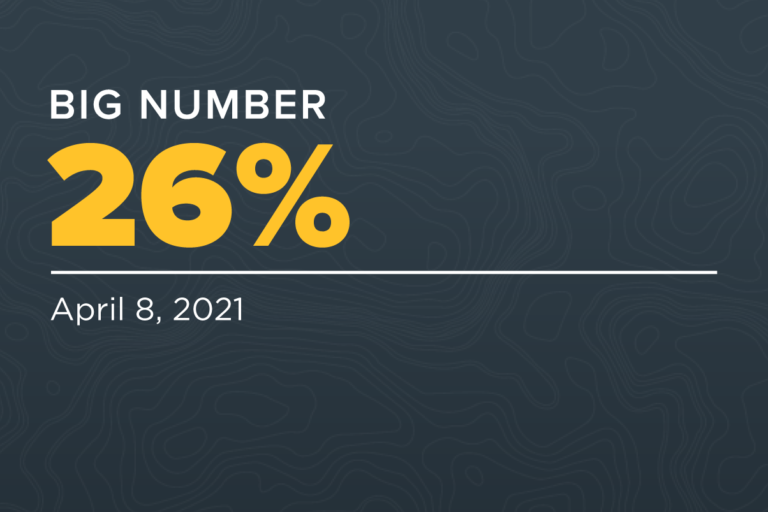
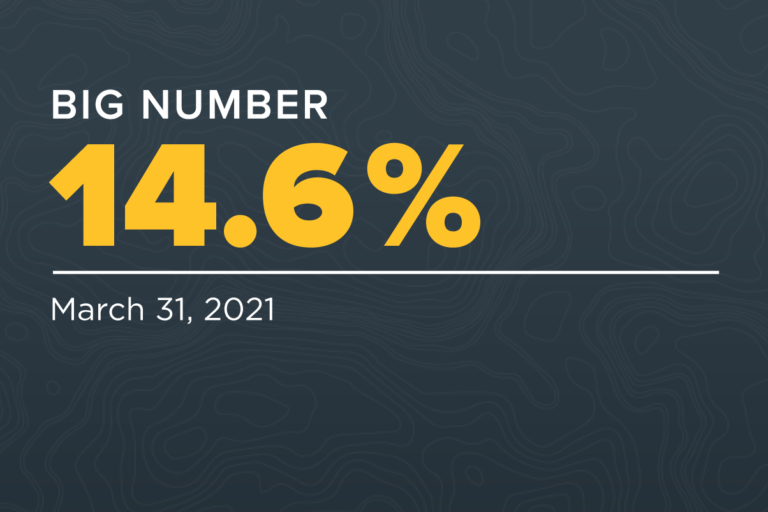


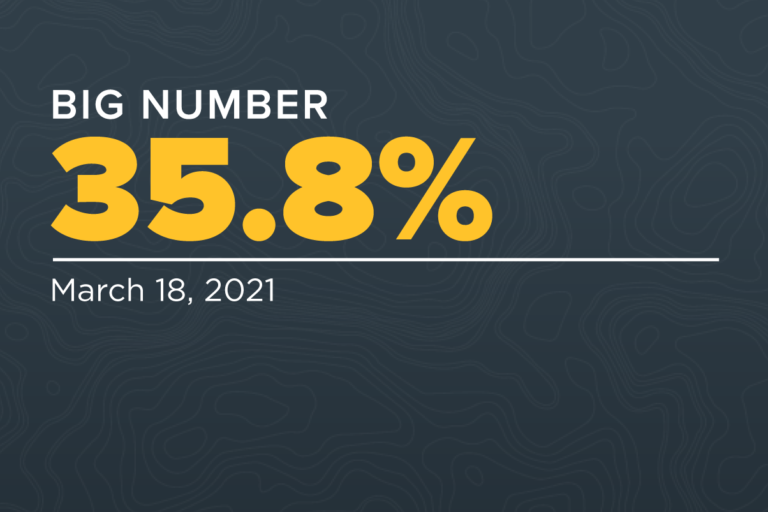
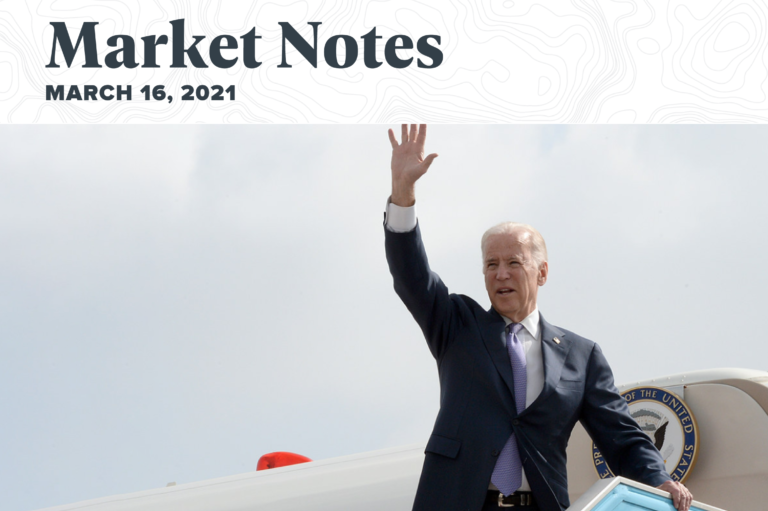
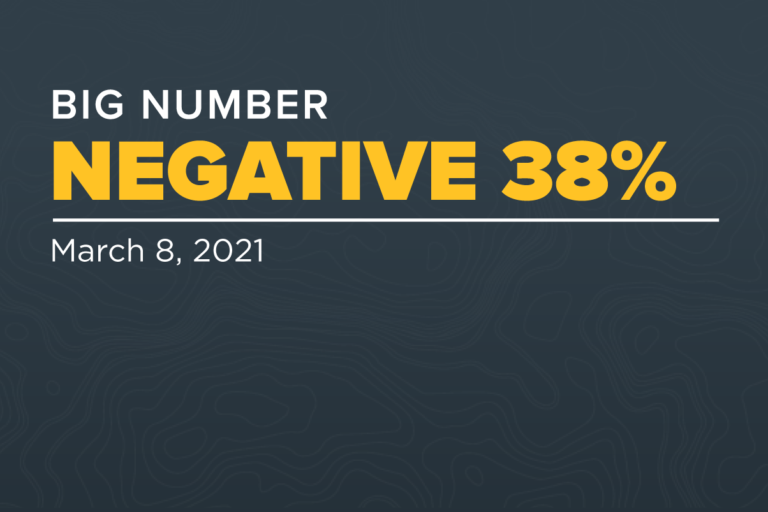



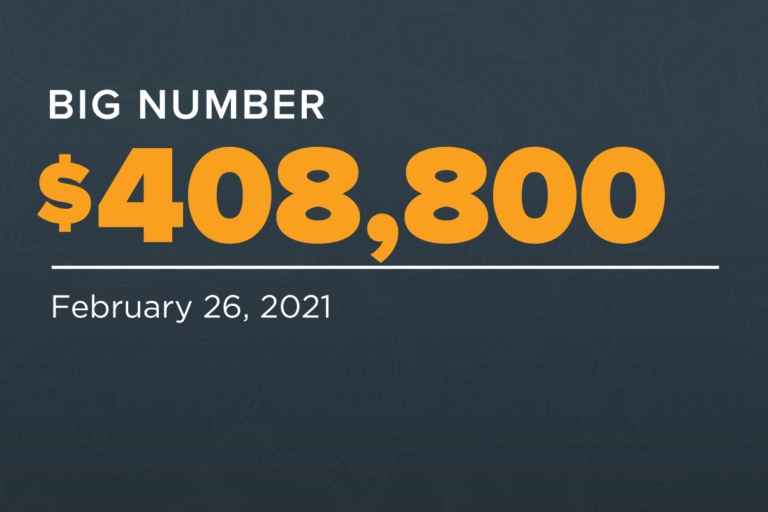

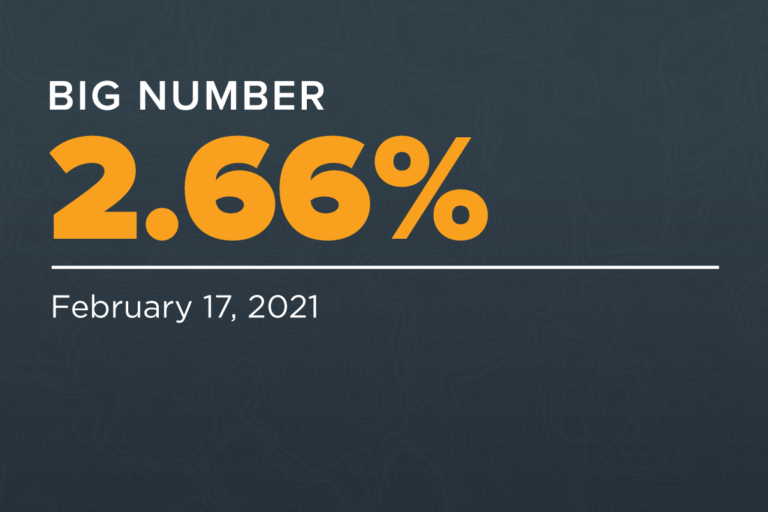
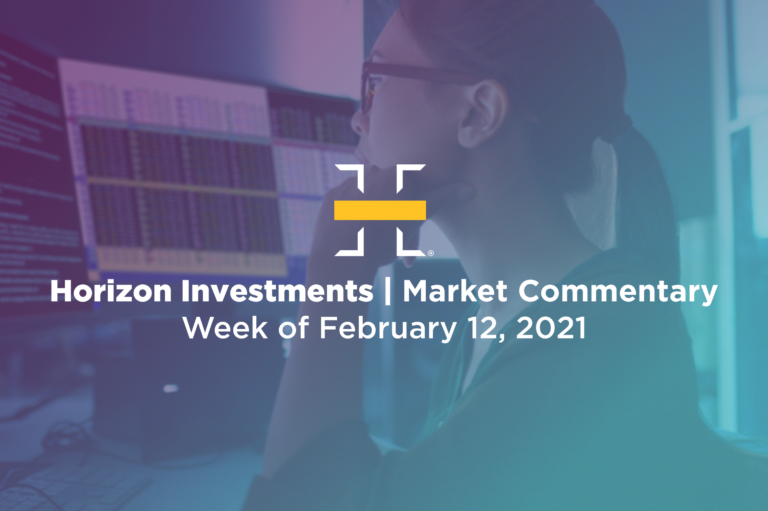

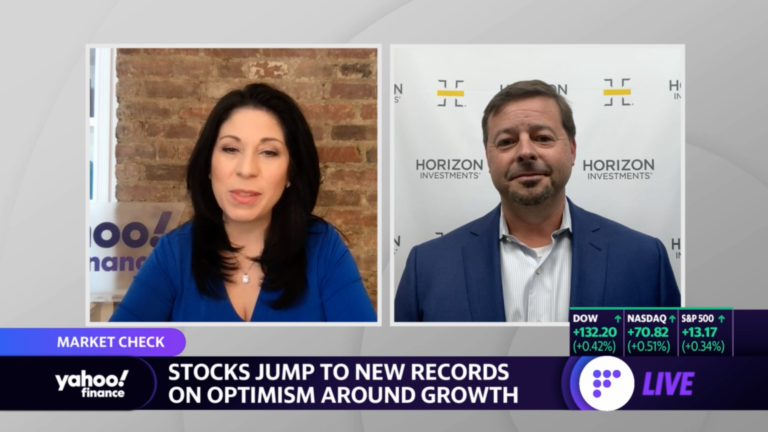



Categories
Topics

Middle East conflicts shouldn’t derail the strong domestic growth story. Rising Middle East tensions caused oil prices to briefly spike last week before reversing course

What happened last week Equities fell for the third consecutive week as rates continued to climb higher. Strong retail sales print supported the trend of

Chief Investment Officer Scott Ladner joins Mornings With Maria on Fox Business to analyze this week’s earnings, recession probability, and Fed decision impacts on inflation.
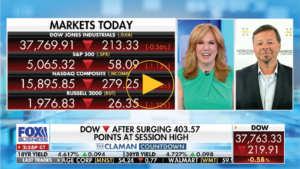
Chief Investment Officer Scott Ladner breaks down the chips and the materials and energy sectors on Fox Business Network ‘The Claman Countdown.’ Watch Video

Can economic growth tailwinds outweigh higher interest rates? Month-over-month retail sales for March topped economist expectations at 0.7%, with February figures revised higher to 0.9%

What happened last week Equities sank as the 10-year Treasury yield surged above 4.5%. Third consecutive upside CPI surprise pushed rate cuts out of market

Chief Investment Officer Scott Ladner and Head of Consulting Solutions Austin Fitch, CFA®, review the first quarter of 2024 and provide a market outlook. Download

Head of Research & Quantitative Strategies Mike Dickson, Ph.D, joins BNN Bloomberg to discuss pivoting from planning for nearly seven rate cuts to less than

Gain Strategies Global stocks put in another strong quarter to start 2024 as continued economic upside surprises, especially in the U.S. and falling bond

Can company profits exceed rising expectations? First quarter 2024 earnings season kicks off this week, on the heels of reports showing both a robust jobs

What happened last week The second quarter opened with a whimper as stocks declined and the U.S. Treasury yield curve bear steepened. Strong economic data,

First-quarter returns suggest the market may have more to give. Stocks went out like a lion in March, with the S&P 500 hitting its 22nd

What happened last week Holiday-shortened week ends 1Q 2024 – U.S. equities (S&P 500) rose over 10%, a strong (85 percentile since 1993) historical quarterly
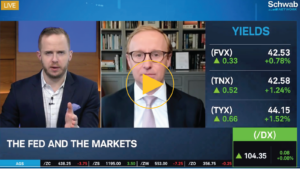
Accelerating inflation and long-term growth have tilted the balance in favor of the hawks. Head of Portfolio Management Zach Hill, CFA®, Joins Schwab Network to

Derivatives can be effective when you know what you’re buying or selling. Covered call option strategies can be an innovative and potentially impactful way to

What happened last week Dovish central bank policy meetings resulted in fresh S&P 500 all-time highs. Market leadership in the U.S.’s largecap growth extended last

Keeping a close eye on Treasury market volatility Volatility in the Treasury bond market is once again flirting with its recent lows. That could be

What happened last week Last week’s price action was choppy and lacked a cogent narrative. 10-year U.S. Treasury yields rose by their most since last

Taking a tactical approach to “junk” bonds Yield-hungry investors eyeing an eventual Fed rate cut are moving into high-yield corporate bonds thesedays, a show of

What happened last week Mega-cap tech underperformed the broad market and equal-weight indices as market breadth improved. The underperformance of mega-cap tech is likely short-term
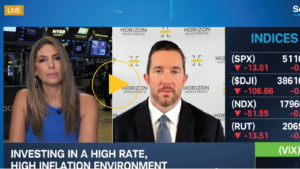
Head of Research & Product Development Mike Dickson, Ph.D., joins Schwab Network to discuss his expectations of Fed rate cuts, investing in a high rate,

Prices of many services are heating up again. Last week, we learned that the Fed’s preferred inflation gauge—the core personal consumption expenditures(PCE) price index—rose by
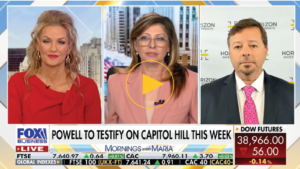
The market has done well in the face of repricing to half of their initial projected Fed cuts this year. CIO Scott Ladner joins Fox
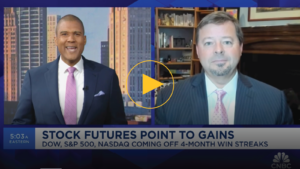
We expect market broadening within the S&P rather than small or mid-caps. Chief Investment Officer Scott Ladner joins CNBC to discuss what’s ahead for the

What happened last week Stocks rose as mega-cap tech and theAI theme continued to propel equitymarkets to new all-time highs. Retail speculation and flow into

Eventually, many clients will rely on the nest egg they have accumulated and preserved to address their financial needs during what may be a lengthy

Do shares of non-U.S. companies deserve a place in your portfolio? With soaring U.S. stocks—and domestic tech stocks in particular—capturing the headlines these days, it’s

What happened last week Nvidia, now a $2 trillion market-cap company, crushed lofty earnings expectations and sent equities to all-time highs. China’s equity performance picked

What happened last week Hot inflation print pushed back the start of rate cuts; more importantly, longer-term interest rate expectations drifted higher, weighing on equities.

Is stocks’ extended winning streak “an offer you can’t refuse”? The S&P 500 has now closed higher for 14 out of the last 15 weeks.

Zach reviews the 4Q23 earnings season, what Horizon anticipates from the Fed and interest rates this year, and how these top-of-mind components translate into portfolio

What happened last week A mega-cap-led rally lifted the S&P 500 above 5,000, a new all-time high. Interest rates continued to drift higher as the

Earnings momentum, disinflation, and a global easing cycle… is the US an attractive place to invest? Chief Investment Officer

Robust consumer spending continues to support a strong economy. Last week’s impressive jobs data—employers added 353,000 new jobs in January, nearly double the expected amount—had
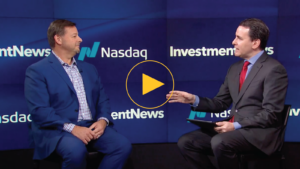
Chief Investment Officer Scott Ladner joins Gregg Greenberg with InvestmentNews to share how Horizon’s goals-based investment management differs from traditional investing. Watch Video

What happened last week Stocks ended the week higher on a mix of very strong AI-driven mega-cap earnings and a large upside surprise to January

The economy and inflation are lining up as investors hoped they would. All eyes were on the Fed this week as it held its first

What happened last week Economic growth remains hot with inflation cooling – the probability of a ‘soft landing’ or ‘no landing’ is increasing. The strong

It could be a great time to buy stocks. Here’s why. Investors celebrated last Friday as the S&P 500 notched its first record-high close in

Until bazooka-style fiscal government spending is announced, we don’t see China as an attractive investment. Chief Investment Officer Scott Ladner joins Bloomberg Radio to discuss

Navigating heightened market volatility and an evolving regulatory landscape has become the new normal for many financial advisors, all while managing the operational and administrative
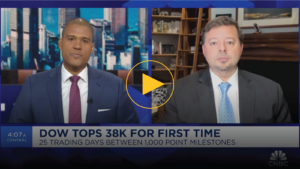
A broader tech. trade could be the largest driver in 2024 as the market moves from hardware technology to the services part of the AI
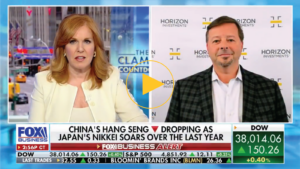
China would need massive fiscal spending to get out of its balance sheet recession and become a wise investment. Chief Investment Officer Scott Ladner
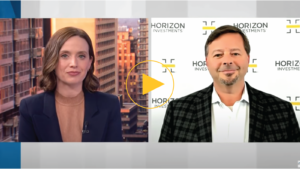
We appear to be in a war-recovery-like period, going through an abrupt normalization process, which we think should lead central banks, especially the Fed, to

What happened last week Action-packed and holiday-shortened trading week underscored by new all-time highs across major US equity indices. Economic data fueled the rally –

“Sticky” shelter costs could keep overall prices uncomfortably high. While inflation’s steady march downward of late has investors (and the Fed) cheering, it may be
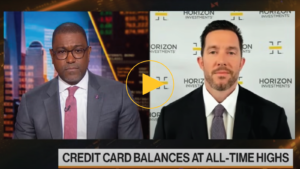
While some headlines focus on credit card debt alone, Head of Research & Product Development Mike Dickson, Ph.D., provides a different perspective on how the

What happened last week Magnificent-7 (“MAG-7”) mega-caps led the “broadening-out” trades’ outperformers (e.g. small caps). Benign December CPI & PPI prints contributed to a dip

OVERVIEW Following a third-quarter slump, stocks roared back to life during the final three months of 2023. The S&P 500 index of large-company stocks rallied

Gain Strategies In a topsy-turvy year for investors and economists alike, 2023 ended on a high note with strong rallies across equities and fixed income.

Value and growth index fund investors may be surprised by their returns last year. Investors commonly own both value and growth stocks to diversify their

Chief Investment Officer Scott Ladner and Head of Consulting Solutions Austin Fitch review the fourth quarter of 2023 and provide a market outlook. Download Presentation

What happened last week The S&P 500 snaps its 9-week winning streak to end Friday less than 3% from all-time highs. Rates moved higher across
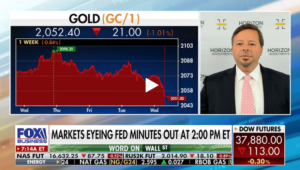
“This Covid cycle that we’ve just been through was not a traditional business cycle. It never has been.” CIO Scott Ladner joins Fox Business to

What happened last week 2023 set a high bar for 2024 market-wise, although new all-time highs are just a hair away from last week’s closing

REGISTER NOW Join Horizon’s Focus Webcast, hosted by Chief Investment Officer Scott Ladner and Head of Consulting Solutions Austin Fitch, CFA®, for a review of

How are the “Magnificent 7” stocks really doing? Outperformance isn’t always exactly what it seems to be. Many investors this year have been hungrily eyeing

What happened last week Last week was a full macro week with a string of positive surprises that drove a bid to risk assets. Consumer

Some crucial context on Americans’ “out of control” debt levels. “Credit Card Debt Crisis” “Credit Card Debt Hits New Record” “Americans Are Drowning in Credit-Card

What happened last week The S&P 500 has rallied for its sixth straight week, retracing back to 1Q ‘22 levels. Small-caps and other higher beta

Most stocks have been laggards this year, but that could be starting to change. It’s no secret that a minute group of tech stocks has

What happened last week A strong seasonal rally is in full swing as the S&P 500 posted its best month since July 2022. The rally
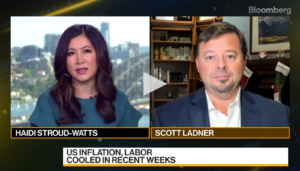
Chief Investment Officer Scott Ladner discusses his outlook for markets and investment strategy. Watch Video

Will December bring glad tidings to small-company stocks? Small-cap stocks have had quite the slog this year. Punished by rising interest rates and lingering fears

Baby boomers have been approaching retirement for a decade, bringing billions of dollars out of retirement accounts as America’s second-largest generation approaches the IRS’s required

What happened last week A short trading week saw the S&P 500 inch toward an all-time high. Short covering starts to narrow the dispersion between
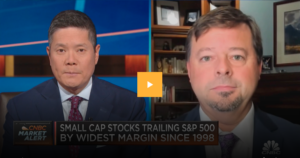
Chief Investment Officer Scott Ladner joins CNBC to discuss the divergence in stock performance between small-cap and large-cap companies. Watch Video

One active approach to risk management is currently beating the market. Risk management can be an important component of goals-based planning. Used well, it has
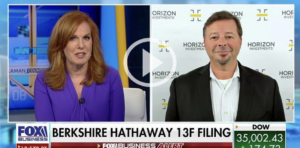
Chief Investment Officer Scott Ladner joins Fox Business ‘The Claman Countdown’ to provide investing advice. Watch Video This is not investment advice or a recommendation
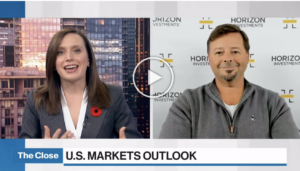
Scott Ladner joins BNN Bloomberg to discuss the U.S. markets, and Powell’s recent comments on raising rates. Watch Video

What happened last week Risk sentiment increased last week, lifting the S&P 500 through key technical levels as Treasury yields plummeted. Bullish price action was

The end of Fed rate hikes suggests good things for equities. The stock market’s surge last week—U.S. and global equities soared nearly 6%—may be the

What happened last week Risk sentiment increased last week, lifting the S&P 500 through key technical levels as Treasury yields plummeted. Bullish price action was
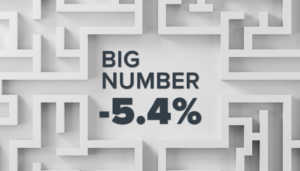
Three years of less-than-stellar financial market performance. It’s been a tough slog for investors over roughly the past three years, with most corners of the

MASTERCLASS: Portfolio Construction The portfolio construction process can be broken down into a series of important decisions, including asset allocation, manager due diligence, and more.

What happened last week Investors reduced market exposure due to geopolitical tensions weighing on equities for the second week in a row. The relative stability

GDP growth over the past three months may have been huuuuuge. Third-quarter GDP growth could be a monster. True, it’ll be a few weeks before

House hunters are facing a shocking number these days. Pity today’s homebuyers who are looking at an average monthly mortgage payment just shy of $2,900.

OVERVIEW During the third quarter of 2023, investors hit “pause” on the rally that had lifted stocks higher for much of the year. The major

What happened last week Stocks and bonds sold off as geopolitical tensions outweighed strong economic and fundamental data. Long-end Treasury yields surged, sending the S&P
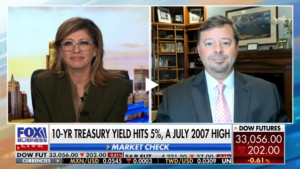
Bond market must get ‘under control’ before stocks rise again. Chief Investment Officer Scott Ladner predicts ‘problems’ with small and mid-capital businesses amid high Fed

Gain Strategies After a surprising and surprisingly positive first half of the year for financial markets, the recovery from the challenging market conditions of 2022

What happened last week Stocks close the week higher despite mounting geopolitical concerns and rising long-term interest rates. Bond market volatility driven by the Middle
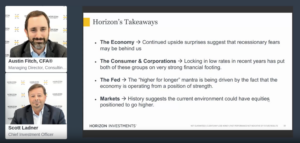
https://www.horizoninvestments.com/wp-content/uploads/2023/10/Q3-Webcast-Super-TB-Small_1.mp4 Chief Investment Officer Scott Ladner and Managing Director of Consulting Solutions Austin Fitch review the third quarter of 2023 and provide a market outlook.

What happened last week Stronger economic data and domestic political turmoil contributed to a resumption of the bond sell-off. Stocks reversed early weakness as a

It’s been bleak days—and lots of them—for bond investors. As the fourth quarter begins, bonds are on track for a third consecutive calendar year of

Look Outside of the Stocks that Gained from the Inflation Trade The staples companies were not hurt on the input side of the inflation equation,

Over the summer months, Horizon conducted the firm’s first annual Advisor Sentiment Survey to gauge opinions and expectations around the current market, interest rates, asset

What happened last week Last week, the quarter ended with both stocks and bonds mainly in the red. Long-end Treasury yields once again surged to

The greenback’s recent rally could have legs. The U.S. dollar is lighting up the charts, rallying for the past ten weeks (see the chart). That’s

What happened last week A more hawkish than expected Fed meeting saw higher interest rate projections in 2024 and beyond. The long end of the

Next-generation investing in AI will take hold in 2024 CIO Scott Ladner joined BNN Bloomberg to discuss the upside in markets, cyclical commodities, Japan’s corporate

Falling interest rate volatility in Treasuries could herald a stock market rally. There are few things that make investors happier than having clarity about where

https://youtu.be/mWhUrUv0Ffo?feature=shared Hear Zach cover what Horizon is taking from recent economic data, our expectations for Fed and monetary policy, and our positioning across equities and

What happened last week Treasury yields continued to move last week higher on strong economic data. U.S. inflation came in slightly hotter than expected, driven

Sharply higher oil prices have the potential to re-ignite inflation. Last week saw oil prices hitting their highest point in 10 months following news that

What happened last week Strong data drove Treasury yields higher and stocks lower in a holiday-shortened trading week. As China signals iPhone bans, $200B of

Historically, the 9th month of the year hasn’t been kind to investors. “April is the cruelest month,” wrote poet T.S. Eliot—who, we assume, didn’t own

What happened last week It was a recovery week for equities as yield moves continued to dictate price action. Labor market data was good news

What happened last week A choppy week in markets saw small recoveries for stocks and bonds. Fed Chair Jerome Powell endorsed a data-dependent message at
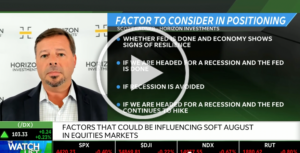
CIO Scott Ladner joined Schwab Network to discuss recent employment and inflation data, factors behind soft August, and artificial intelligence.

There are few signs of the economic struggles predicted at Jackson Hole last year. Attention will be focused on Wyoming this week, where the 46th

What happened last week The push higher in Treasury yields drove the third consecutive week of simultaneous losses in equities and core bonds. Retail sales

Stock investors may want to brace for some bumps in the road. After months of gains and low volatility from stocks, emerging signs show that
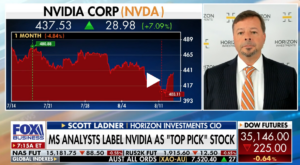
Chief Investment Officer Scott Ladner joined Fox News to provide critical tips to investors on ‘Mornings with Maria.’

What happened last week Pressure building on the disinflation narrative as global bond yields surge and commodities continue their rally Domestic equities were also lower


What happened last week Negative bond market developments likely drove the sell-off in equities Jobs report pointed to easing wage growth, indicative of progress towards

https://youtu.be/e26Kr8v2gvg Head of Portfolio Management Zach Hill, CFA® covered why the Fed matters less today, takeaways from earnings season, and under-the-radar macro themes we are

CIO Scott Ladner joined Yahoo! Finance to discuss portfolio positioning and how to prepare for the Fed.

Other market sectors are showing signs of life. The S&P 500 continued its winning streak in July and is up more than 20% in 2023.

What happened last week Stocks climbed as the Fed and European Central Bank (ECB) raised rates to 22-year highs Continued string of strong US data

Is the Fed’s battle to contain inflation finally done? The market seems to think so. Recent comments from multiple Wall Street firms and economists suggest
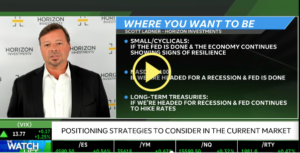
CIO Scott Ladner joined TD Ameritrade to discuss this week’s FOMC meeting and A.I.’s potential impact on sectors.

What happened last week Global stocks edge higher, led by the US, in a week characterized by slow and sluggish summer sessions Regional banks rallied,
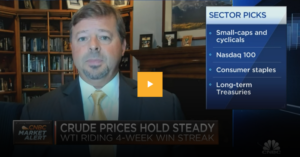
Chief Investment Officer Scott Ladner joined CNBC to discuss what’s ahead for the busiest week of the summer on Wall Street.

The S&P 500’s lowest correlation level in years suggests outperformers and underperformers should emerge. Think the S&P 500’s low volatility these days means all is

When was the last time a client asked, “What was my portfolio’s alpha?” You may encounter that question with institutions and sophisticated clients, but more

OVERVIEW During the second quarter of 2023, several key equity market indices built on their gains from the prior three months (see Exhibit 1). For
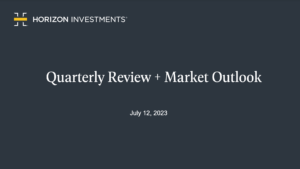
https://youtu.be/etvuMLvXBAM Chief Investment Officer Scott Ladner and Managing Director of Consulting Solutions Austin Fitch review the second quarter of 2023 and provide a market outlook.

Gain Strategies After a furious and volatile start to the year for stock and bond markets, the second quarter provided a welcome respite for investors

Will six months of returns cause you to forsake global diversification? While it’s true that “the market” is up for the year, it’s really a

What happened last week Equities sold off in volatile trading to start the third quarter Continued economic resilience drove Treasury yields higher and weighed on

Horizon Investments chief investment officer Scott Ladner analyzes the market as it enters the second half of 2023. Read Article
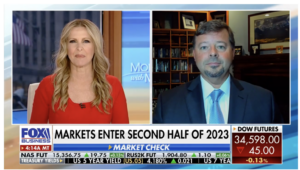
Horizon Investments chief investment officer Scott Ladner analyzes the market as it enters the second half of 2023. Watch Now

What happened last week Strong end to a strong quarter with the S&P 500 closing at its highest level since last April Global yields rose

Stock market volatility has fallen to multi-year lows? “Merrily, we roll along, roll along.” Those Stephen Sondheim lyrics pretty much summarize the sentiment among a

What happened last week Stocks sold off with small caps, value, and internationals leading losses as narrow market leadership continued Monetary policy developments were negative
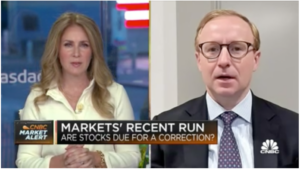
Zachary Hill, CFA, joins ‘Squawk Box’ to discuss the latest market trends, whether stocks are due for a correction, and more. Watch Now

With the oldest baby boomers over eleven years into retirement and the oldest Generation X members just eight years away, we now have over 135

The housing market is the latest economic indicator to light up the charts? One of the key leading indicators of future economic activity—construction of new

What happened last week Increasingly positive investor sentiment boosted the S&P 500 closer to all-time high levels Fed delivers “hawkish pause,” signaling a hike in

Does This Market Have Staying Power? Stocks escaped the bear’s grip. What comes next Investors cheered last week as the S&P 500 broke free of

What happened last week It was a quiet week, with recent trends reversing in favor of year-to-date underperformers like small-caps and Chinese equities. Technical factors

The positive surprises in the labor market just keep on coming. Job creation in the U.S. continues to defy expectations. Case in point: last week’s

What happened last week Friday’s strong labor market data defined the trading week. A bipartisan debt ceiling bill averted the tail default scenario, suspending the

A.I. could be the most important productivity-enhancing development for the global economy since the uptake of the internet, notes Chief Investment Officer Scott Ladner. Watch

Is the fast-moving market moving too fast? Technology stocks generally hate higher interest rates. Tech companies often need ongoing access to lots of capital to

What happened last week A debt ceiling agreement was reached, and will likely become law this week. NVIDIA earnings were released and the results offer

CIO Scott Ladner, and Managing Director Austin Fitch, CFA® discuss the debt ceiling debate, disinflation, equity allocations, and the current market environment. https://youtu.be/Sjn6C0NsP9g

Active management aims to navigate trends as they emerge—and fade We believe an active, dynamic approach to portfolio management can provide investors the potential to

What happened last week The market saw year-to-date highs in stocks despite a lack of progress on the debt ceiling negotiations in Washington. Hawkish Fed

Apple is once again worth more than the entire Russell 2000 In Marvel movies, it’s common for one superhero to be bigger than an entire

Fear-inducing headlines are likely painting too grim of a picture. Silicon Valley Bank. Signature. First Republic. PacWest. Comerica. The list of regional banks that have

Hear Zach Hill, CFA®, cover earnings season, Fed policy, and what Horizon is watching in the markets. https://youtu.be/27YkbeBM_yc

Investors seem to be a relatively calm, cool, and collected bunch these days—which may be a harbinger of stock market strength in the coming months.

Overview The idea that the financial markets “climb a wall of worry” by showing resilience in the face of significant challenges was fully displayed during
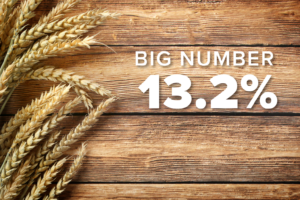
Identifying investment opportunities may take a sharper focus going forward Fears about banks’ financial health have dominated many investors’ thoughts for weeks. But as we

Gain Strategies Investors shifted among dominant themes numerous times in what was a volatile but generally positive first quarter of the new year for equities

What tools can investors use to fight longevity risk in retirement? Many retirees today probably remember the 1976 disco hit “Right Back Where We Started
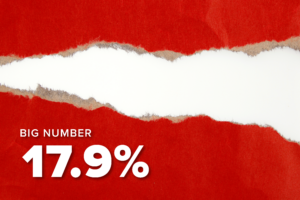
There’s tech, and there’s the rest Investors in tech stocks these days are a wildly happy bunch. Everybody else? Not so much. The gap between

Key Takeaways Investors require different outcomes from their investments, a one-size-fits-all passive approach is unlikely to work for everyone. Horizon believes tactical strategies can offer

Here’s something we have only seen once in 20 years In a true study of contrasts, the tech-heavy Nasdaq 100 index has soared 6.3% during

Scott Ladner and Austin Fitch discuss the Fed announcement and the current market and what they are watching.

Stocks stand to benefit if the Fed eases up on the brakes Continued concerns about the health of the U.S. banking system and economy have

Bank woes raise questions about the Fed’s next move. Investors’ sudden hunger for U.S. government bonds has pushed yields to their lowest levels in months—and created

Chip stocks have come out swinging to start 2023 In what could be a harbinger of things to come for the markets, semiconductor stocks are

The U.S. real estate market has been flexing its muscles in recent weeks. Unexpected strength in the real estate market this week is the latest
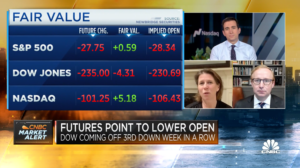
“The U.S. economy looks pretty strong, and we think that will feed into corporate profits.” – Zach Hill, Head of Portfolio Management

U.S. stocks have clearly perked up so far this year. But now, two key market metrics show a heightened level of risk in domestic equities

https://www.horizoninvestments.com/wp-content/uploads/2023/02/Fast-Take-Final-Video.mp4 Hear Zach Hill, CFA®, Head of Portfolio Management, cover Horizon’s thoughts on the state of the economy, Fed policy, equities and fixed income.

In the consumer market, high-quality products are identified as reliable, longer lasting, and are generally viewed very positively. Names of iconic brands receive instant recognition,

In the wake of a bruising 2022, investors seem to have decided that “risk on” is where it’s at this year. Case in point: High-beta

Expected interest rate volatility has fallen 28 points so far this year The financial markets are predicting less volatility in interest rates during the coming

Gain Strategies The final quarter of what has been a difficult year for asset owners finished on a positive note as both global stocks (MSCI

Overview Financial markets suffered sizable—in some cases, historic—losses in 2022. Soaring inflation combined with an aggressive monetary policy response by the Federal Reserve Board created

Investors eye foreign markets and like what they see. For more than a decade, international stocks have lost performance race after performance race to the

Put “protection” has come up short lately—but there’s a better way. Put options are often a go-to risk management strategy among investors seeking protection against

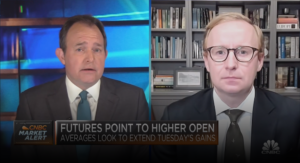

WATCH VIDEO

Up is down, and down is up Two key components of the equity market—growth stocks and value stocks—are looking significantly different as 2023 gets underway,
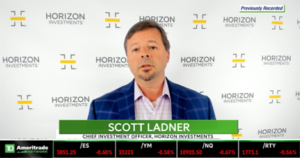
Hear Scott talk about areas of the market to watch in 2023, and his expectations for after inflation has cooled. WATCH VIDEO
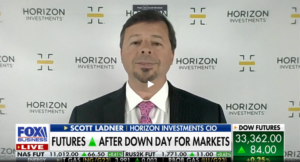
Scott provides insight on the state of the market.
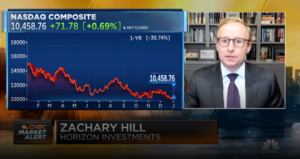
WATCH VIDEO

“For tech and communication services, there was this belief that those revenue streams were impervious to the ups and downs of the economy” READ FULL
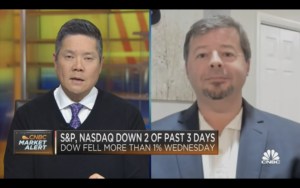
Ladner: We think there will be a lot of tailwinds for the markets in the back half of next year. WATCH NOW

https://www.horizoninvestments.com/wp-content/uploads/2022/12/Zach-Hill-V5.mp4 Hear Zach Hill, CFA®, Head of Portfolio Management, cover Horizon’s thoughts on what’s ahead in 2023 for Fed policy, the run in value stocks

This year we have seen a first for stocks and bonds. Welcome to uncharted territory. As we head to the finish line, stocks are down
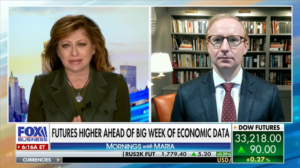
Zach Hill, CFA® discusses concerns around markets and the economy in 2023 on Mornings with Maria. WATCH NOW

Everybody can appreciate a smooth ride—and for investors, a journey without too many bumps along the way can potentially result in more wealth. One

Throughout 2022, investors have seen various positive economic developments as signs that the Federal Reserve Board was ready to pivot and end—or considerably scale back—its
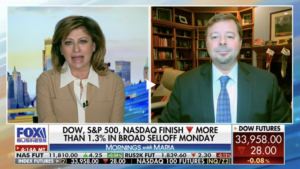
Scott Ladner recently appeared on ‘Mornings with Maria’ with Fox Business to review inflation, the job market, interest rates, and more. WATCH NOW
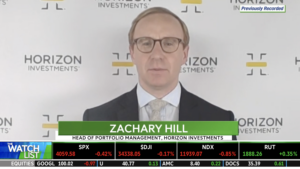
Zach Hill, CFA® joined Nicole Petallides on TD Ameritrade Network to discuss the takeaways from the jobs report that came out on December 2nd. WATCH

Could bond investors find the next few months to be “the most wonderful time of the year?” High-yield (or “junk”) bonds—along with the rest of
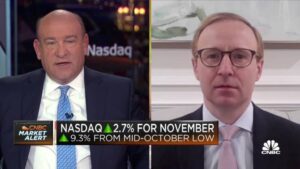
Horizon’s Head of Portfolio Management, Zach Hill, CFA®, joined Squawk Box Friday to discuss the inflation trade, expectations for this week’s Fed meeting, and his

https://www.horizoninvestments.com/wp-content/uploads/2022/11/Zach-Hill-Fast-Take-FInal-Video.mp4 Hear Horizon’s thoughts on quarterly earnings, Fed policy, and market outlook. Disclosure: The commentary in this report is not a complete analysis of every

Investors won’t have to dip into their savings to pay for their Thanksgiving feasts this year, but they may choke on their pumpkin pie when they

Investors are shifting gears in the wake of good inflation news. Will it last? The tide is turning—maybe. Following last week’s news of lower-than-expected inflation,

“The market is – as it has been a few times this year – very eager to trade a ‘Fed pivot’ … but we think

The losers of the past are riding high—while yesterday’s winners appear to be out of gas. To sail to your destination, you need to put
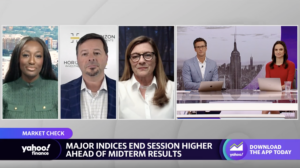
CIO Scott Ladner joined Yahoo Finance Live to discuss Fed policy and inflation, economic data, and overall volatility. Watch the Video

We’re more than halfway through the third-quarter earnings season, and thus far, the S&P 500 overall is reporting its worst year-over-year earnings growth since the third
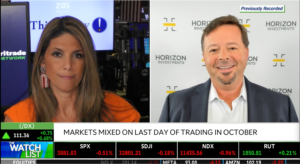
Scott Ladner joined Nicole Petallides on TD Ameritrade’s ‘The Watch List’ to discuss the market, what investors have learned from earnings season thus far and

Ron Saba weighs in on shifting focus from tech stocks to so-called value stocks in the Wall Street Journal. Read Article

The squeeze on homebuyers appears to be getting tighter by the month—which could spell trouble for multiple sectors of the economy in the future. Today,
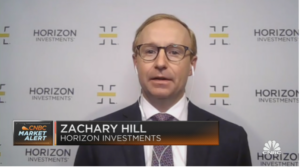
Horizon’s Head of Portfolio Management, Zach Hill, CFA®, discussed his expectations for earnings estimates, the impacts of inflation, and his thoughts on specific sectors. Watch
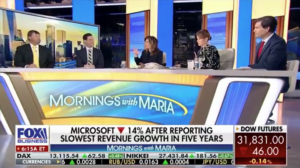
CIO Scott Ladner joined Maria Bartiromo on Fox Business to discuss the impact of inflation on earnings and his thoughts on the economy and a
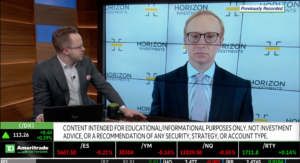
Zach Hill, CFA® shares his expectations around negative demand, the next Fed meeting, and his thoughts on particular sectors. Watch the Video
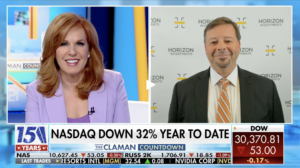
Horizon Investments CIO Scott Ladner explains the lull in chip demand and why now is the time to invest in tech stocks on ‘The Claman

“It’s interest rates that are driving equity volatility, that is the way we have been looking at things all year, that is kind of the

We all know that last week’s inflation report showed headline inflation continues to surge, with the consumer price index (CPI) accelerating by 8.2% in September
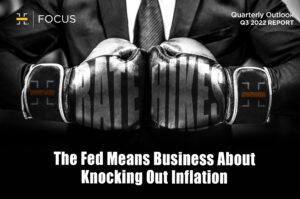
Central bankers have become laser-focused on crushing inflation. What could that mean for the economy and investors? Overview Investors found few places to hide from

Gain Strategies This year’s punishing price action across markets continued last quarter as global stocks (MSCI ACWI Index), and core bonds (Bloomberg U.S. Aggregate Index)

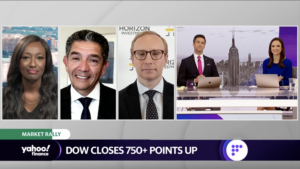
Head of Portfolio Management Zach Hill, CFA® joins Yahoo! Finance to weigh in on recent market volatility, bond yields, and why investing in equities may

CIO Scott Ladner joins BNN Bloomberg to discuss the BOE announcement, global growth, and sectors.
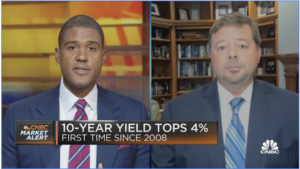
CIO Scott Ladner joins CNBC to discuss Treasuries, the Fed’s next moves, and the impact of inflation on the markets.

It’s a game of “catch me if you can” between investors and the Fed these days. For the most part, the Fed’s recent series of
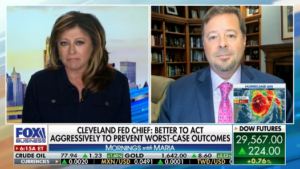
CIO Scott Ladner argues housing leads the economy and will cause a market ‘softening’ as he joins Maria Bartiromo on Fox News Media
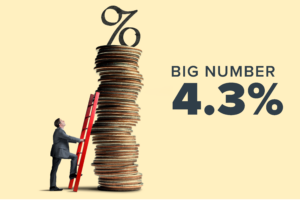
Tomorrow, the Federal Reserve Board is set to announce its latest decision regarding interest rates. Will it be yet another 75-basis point increase, as many
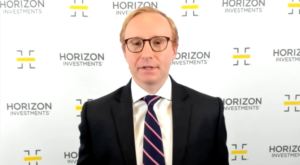
“The recent CPI report threw cold water on hopes that the Fed could ease up on policy tightening aimed at cooling inflation.” Zachary Hill, CFA.
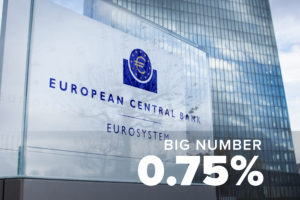
All eyes were once again on interest rates last week, as the European Central Bank (ECB)—the eurozone’s equivalent of the Federal Reserve Board–raised interest rates
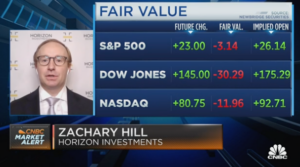
Head of Portfolio Management Zachary Hill, joined CNBC Worldwide Exchange to discuss the markets ahead of the August CPI print.

https://www.horizoninvestments.com/wp-content/uploads/2022/09/Fast-Take-With-Zach-Hill.mp4 Hear Horizon’s view of the markets as we head into the fall, along with our expectations around Fed policy, global economic conditions, and our
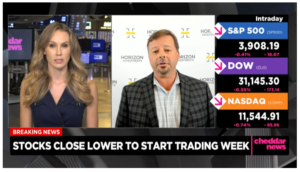
Chief Investment Officer Scott Ladner, joined Cheddar News’ Closing Bell to discuss U.S. stocks after investors returned to trading action following Labor Day weekend.
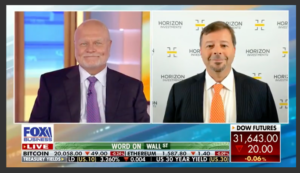
Chief Investment Officer Scott Ladner joined ‘Morning with Maria’ to weigh in on the August jobs reports and unemployment rate.
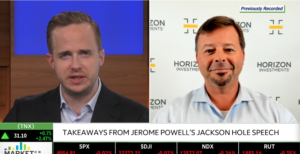
“Nominal GDP slowdown has been baked in the cake. The stock market today has started to move on from inflation to recession fears. Don’t fight

Demand for new homes is way down. What does that mean for investors? New home sales plunged in July, falling nearly 13% to a seasonally-adjusted

Historical Recessions Given the increase in signs of a cooling economy, this study aims to explain what typically happens before and during recessions, answering the

It’s a safe assumption that when Bob Dylan sang “the first one now will later be last,” he didn’t have financial markets in mind. And

What a difference a couple of months can make. Since hitting its low point (closing price) for the year on June 16, the S&P 500

Is More Volatility Coming Down the Pike? Investors looking for greater clarity about the road ahead for equities—and a break from market volatility—probably shouldn’t hold

As investors digested both the Fed’s decision to raise interest rates by another 75 basis points and the news that U.S. economic growth declined in

The U.S dollar continues its steady march higher, up 14.7% during the past 12 months. That sharp rise, coupled with the euro’s ongoing slide, created
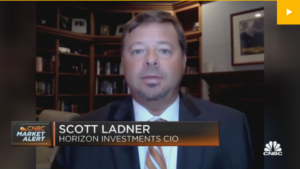
Scott Ladner, CIO of Horizon Investments, joins Worldwide Exchange to discuss his views on inflation and the Fed’s big decision this week.

Overview Investors faced a wall of worry during the second quarter that proved to be insurmountable for stocks, bonds and virtually every other asset

Gain Strategies The second quarter of 2022 was another difficult one for asset markets as investors continue to grapple with the outlook for inflation

Over the next few weeks, a steady stream of second-quarter earnings reports will reveal how companies have navigated historically high inflation, continued supply chain challenges,

The S&P 500 hasn’t seen two consecutive quarters of negative returns since the global financial crisis—until now, that is. The index’s -16.1% return during the

Economists surveyed by the Wall St. Journal now say there’s a 44% chance of a recession—up from just 18% in January. The newspaper noted that
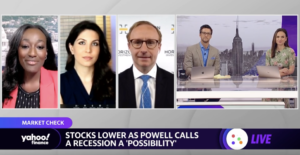
Zach Hill, CFA and ERShares COO Eva Ados joined Yahoo Finance Live after the closing bell to examine the possibilities of a recession amid market

Red-hot inflation, and the Fed’s now-aggressive efforts to fight it, are pushing up mortgage rates at their fastest pace on record—and potentially putting the squeeze

Zach Hill, CFA®, head of portfolio management at Horizon Investments, says this bear market is likely to stick around a while. Photo Source: Traders work
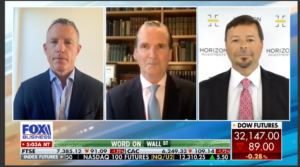
CIO Scott Ladner joined Brigg MacAdam LTD founding partner Greg Swenson and Rosecliff Capital CEO Mike Murphy on ‘Word on Wall Street’ to unpack markets

American workers are reliving the past – and that’s a potentially big problem. The reason: Real wages adjusted for inflation have recently declined, in some
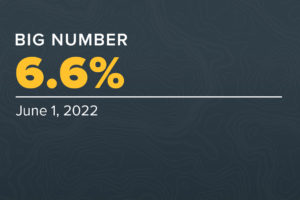
Equity markets sent investors smiling into the Memorial Day weekend, thanks to the biggest weekly gains for the S&P 500 (+6.6%) and the Dow Jones

CIO Scott Ladner joined Bloomberg to share his expectations for the market and why boring investments may be prudent.
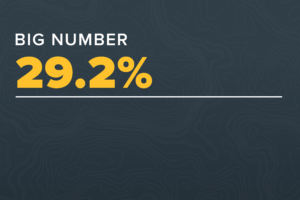
With the Nasdaq plummeting 27.2% and the S&P 500 Growth Index close behind at -26.2%, growth stock investors have taken it on the chin this

https://www.horizoninvestments.com/wp-content/uploads/2022/05/Horizon-Investmenst-Mid-Quarter-Update-Small.mp4

Last week ended with the S&P dipping briefly into bear market territory before closing higher on Friday. Inflationary pressures fueled by supply chain kinks and
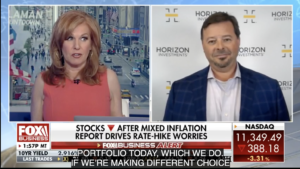
CIO Scott Ladner joined Liz Claman to discuss this week’s market sell-off and share his thoughts on sectors, geopolitical risk, and the Fed.
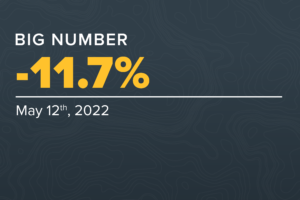
Investors in balanced portfolios these days may feel like they’ve fallen off a tightrope. The classic portfolio of 60 percent equities and 40 percent fixed-income—the

Scott Ladner talks macroeconomics and a global view on markets with Ausbiz.

“…unless supply chains heal rapidly or workers flood back into the labor force, any equity rallies are likely on borrowed time as Fed messaging becomes
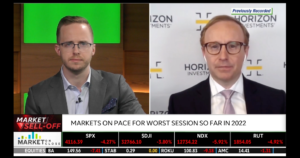
Stocks fell hard Thursday, May 5, 2022 following the FOMC meeting announcement in which the Federal Reserve raised rates by 50 basis points as the

Investors have been dumping high growth stocks for weeks, due to worries about inflation, rising interest rates and a potential economic slowdown. Horizon’s Zach Hill

Scott Ladner on air for Mornings with Maria Bartiromo. Scott sheds light on the micro vs macro market drivers. Tune in around the 2:20 marker.
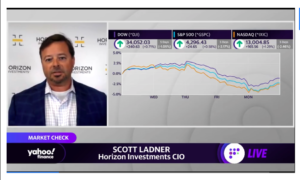
Scott Ladner joins Kristina Hooper after the closing bell yesterday on Yahoo Finance to discuss economic uncertainties behind China’s supply chain and COVID lockdowns, outlook

There’s something strange happening with energy ETFs. Zachary Hill, CFA comments on the sector’s flagships ETFs

The broader tech sell-off comes after the Federal Reserve announced plans to hike interest rates in an attempt to cool inflation. Scott Ladner, CIO, Horizon

Investors liked what they heard from the Fed this week. The Federal Reserve Board raised the Federal Funds Rate by 50 basis points (0.50 percentage

Bonds are usually thought of as a safe haven for investors due to their lower risk/ lower return profile. For investors preparing for retirement, or those

No doubt about it: Fixed-income investors are spooked. Volatility in U.S. Treasuries has soared this year. As seen in the chart, the 10-day moving average

The truth is, individual investors today don’t care as much about exposures as they do outcomes. They’re asking how to build portfolios that will help

We know that in Preservation, clients either ask or at least ponder: What product gives me all the upside and no downside? Ah, the holy

Kahneman’s Behavioral Approach Noise: an unwanted variability in decision-making. Ask yourself, when am I at my best? Are you a morning person? Are you a

Investment professionals rarely agree on the risks and direction of markets, yet many would agree that planning for retirement is one of the most important

We see active financial advice as the new reality. Not robo. Not passive. But active! Today, we can see an emerging problem with the “do

U.S. companies start to report the effect of decades-high inflation on their profit margins.

“Volatility in the bond market is simply too high right now…” Zachary Hill, CFA is quoted on CNBC earlier today. As investors are keeping their

As Americans become more comfortable with Covid-19’s transition from pandemic to endemic, two of our key expectations for this year are that consumer spending will
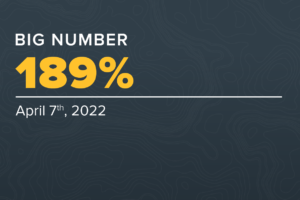
Now that the Federal Reserve Board has started raising rates, the upcoming first quarter earnings season could arguably be one of the most interesting and

Zachary Hill, CFA‘s insights on the economic health from a consumer and corporate perspective.
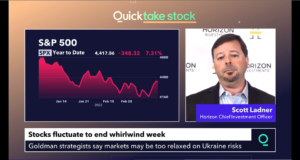
Stocks fluctuate to end whirlwind week. But have we hit the bottom?

Fed Finally Moves Against Inflation With Rate Hike.

Wall Street adds to gains following surge in Chinese markets
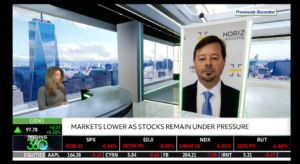
Watch this short video as Scott Ladner discusses the current market environment, the Fed, interest rates and more on TD Ameritrade Network.
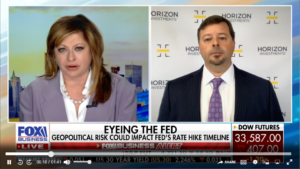
Horizon Investments CIO, Scott Ladner was on Mornings with Maria Bartiromo on Fox Business Network to discusses the impact the Russian invasion of Ukraine has

Horizon Investments CIO, Scott Ladner joins Yahoo Finance Live to discuss the outlook for the stock market ahead of President Biden addressing geopolitical tensions between
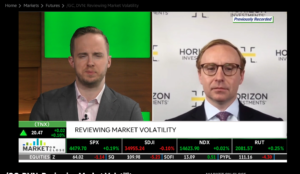
Zachary Hill, CFA, Head of Portfolio Management at Horizon Investments, reviews market volatility with TD Ameritrade. Tune in to find out more.
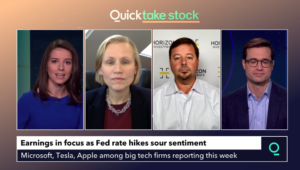
With such a choppy week so far in the markets, we pose the question, ‘Will the Federal Reserve run to the rescue?’. Listen to Scott
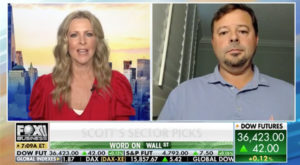
In case you missed it, check out Horizon Investments’ CIO Scott Ladner discussing his market sector picks on ‘Mornings with Maria’ on Fox Business Channel.

Listen to what Scott Ladner, Horizon CIO, and Kevin O’Leary, O’Shares, say about hedging against rising inflation.
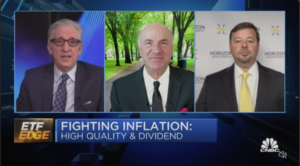
Tracking alternative investments to Treasurys Kevin O’Leary of O’Shares and Scott Ladner of Horizon Investments discuss their favorite alternatives to bonds in the hunt for
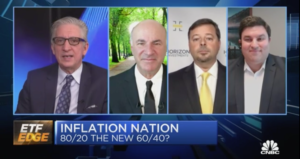
One sector’s secret weapon against rising inflation, according to ETF manager Alexi Panagiotakopoulos of Fundamental Income joins Kevin O’Leary of O’Shares and Scott Ladner of

Stocks closed the first trading week of 2022 in the red as investors digested a key report on the U.S. labor market recovery at the
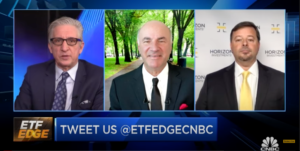
Kevin O’Leary of O’Shares joins Scott Ladner of Horizon Investments to discuss how to invest in an inflationary environment.

Flush with new cash, Horizon Investments is even better positioned to provide first-rate advice to investors on the best ETFs and funds in the market.

Check out what Zachary Hill, CFA, Horizon Investments’ Head of Portfolio Management, had to say about defensive stocks and what we could see in this

Tech stocks spur Wall Street slide as investors continue to monitor inflation impact
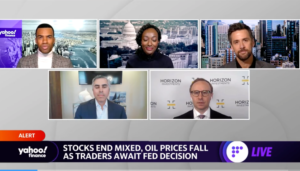
The waiting game is almost over. Zachary Hill, CFA weighs in onthe Fed’s decision coming tomorrow.

Investors sure are a gloomy bunch these days. How downbeat are they? According to the AAII Investor Sentiment Survey1 (a weekly poll measuring individual investors’

As expected, the Federal Reserve Board on Wednesday raised the target range of the federal funds rate—a key short-term interest rate—by 25 basis points from



Inflation sticker shock is spreading; 55% of the items in the Consumer Price Index have an annual inflation rate of at least 5% in October.

Many investors and financial advisors are still in the dark on what ESG factor investing means and how quickly the data behind this style of
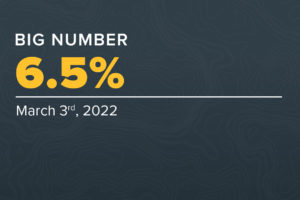
Inflation sticker shock is spreading; 55% of the items in the Consumer Price Index have an annual inflation rate of at least 5% in October.

Inflation sticker shock is spreading; 55% of the items in the Consumer Price Index have an annual inflation rate of at least 5% in October.
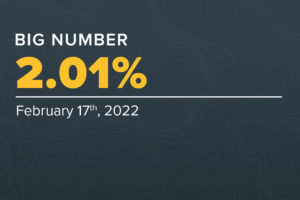
Inflation sticker shock is spreading; 55% of the items in the Consumer Price Index have an annual inflation rate of at least 5% in October.

Inflation sticker shock is spreading; 55% of the items in the Consumer Price Index have an annual inflation rate of at least 5% in October.
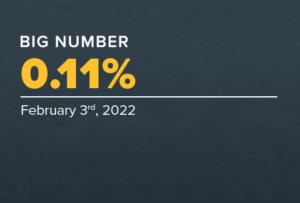
Inflation sticker shock is spreading; 55% of the items in the Consumer Price Index have an annual inflation rate of at least 5% in October.

Inflation sticker shock is spreading; 55% of the items in the Consumer Price Index have an annual inflation rate of at least 5% in October.
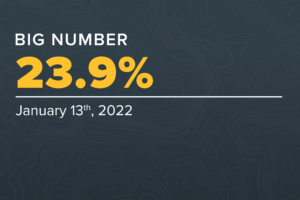
Inflation sticker shock is spreading; 55% of the items in the Consumer Price Index have an annual inflation rate of at least 5% in October.

Inflation sticker shock is spreading; 55% of the items in the Consumer Price Index have an annual inflation rate of at least 5% in October.
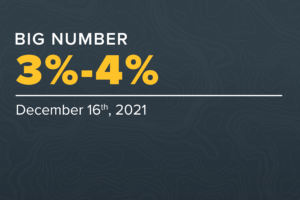
Inflation sticker shock is spreading; 55% of the items in the Consumer Price Index have an annual inflation rate of at least 5% in October.
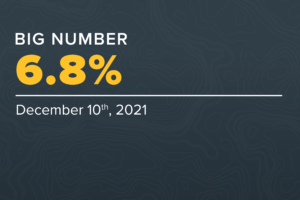
Inflation sticker shock is spreading; 55% of the items in the Consumer Price Index have an annual inflation rate of at least 5% in October.
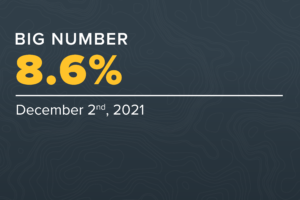
Inflation sticker shock is spreading; 55% of the items in the Consumer Price Index have an annual inflation rate of at least 5% in October.

Inflation sticker shock is spreading; 55% of the items in the Consumer Price Index have an annual inflation rate of at least 5% in October.
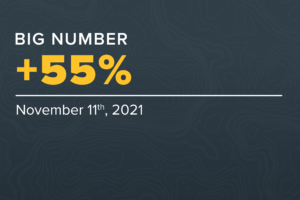
Inflation sticker shock is spreading; 55% of the items in the Consumer Price Index have an annual inflation rate of at least 5% in October.
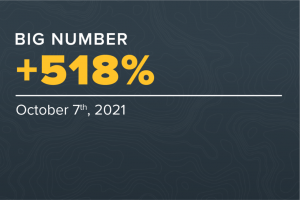
Eye-popping jumps in energy prices worldwide has some people proclaiming we’re in a replay of the stagflation of the 1970s. That view ignores substantial

From the youngest to the oldest American workers – GenZ to Baby Boomers – their greatest fear about retirement is…

A large swath of the GenX population, many of whom are 20 years or less from the end of their working careers, say they don’t

The march higher in the cost of home health, assisted living or nursing home services continues. The blended cost of providing a year’s worth…

American workers just got another jolt of bad news about the financial health of Social Security. A recent report moved up the program’s insolvency date…

Federal Reserve Chairman Jay Powell repeated his view at last week’s Jackson Hole meeting that the jump in inflation would be “transitory” as supply…
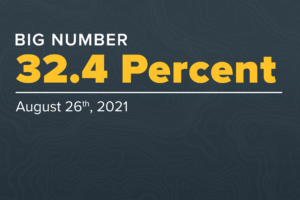
There’s a record-breaking chasm opening up between American and Chinese stocks this year. The SPDR S&P 500 ETF (SPY) is outperforming…

The Baby Boomer retirement wave, egged on by Covid, rolls on. Another 248,000 Americans over the age of 65 left the labor force last month…

The Baby Boomer retirement wave, egged on by Covid, rolls on. Another 248,000 Americans over the age of 65 left the labor force last month…

You’ve likely heard that second quarter profits are surging, driven by easy year-over-year comparisons and the reopening of the economy…

Target date funds operate under the assumption that someone’s asset allocation should follow a glide path, automatically shifting a portfolio…

Yet another setback for retirees who view traditional fixed-income investments as a secure way to fund a long retirement…
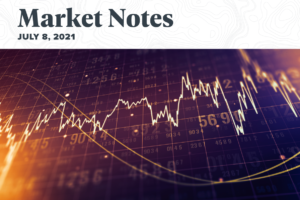
The July 4th holiday’s fireworks extended into the work week on Wall Street. The 10-year Treasury note rallied further and faster than many…

The Federal Reserve’s meeting last week sparked a selloff in stocks and bonds as the central bank’s projections showed it may bump up interest rates..

Capturing the pandemic’s weird real-world effects is reflected in how high above trend retail sales are, at 12.9%, versus how far…
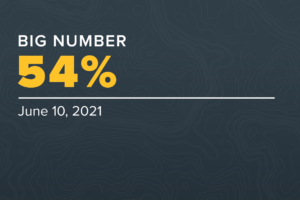
Bidding wars for homes has soured people on reaching for the American dream: for the first time in nearly 40 years, a majority of…
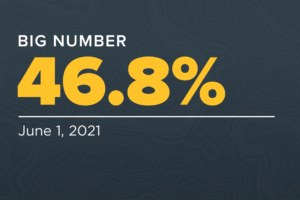
What was a rumbling of change in the last few years is now barreling into the mainstream with widespread name recognition of Bitcoin and…
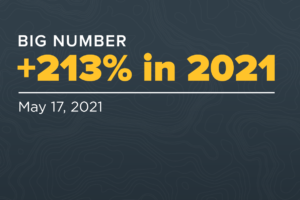
What was a rumbling of change in the last few years is now barreling into the mainstream with widespread name recognition of Bitcoin and…
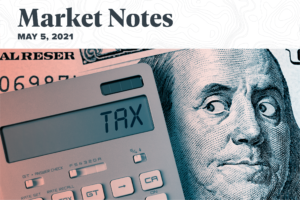
They’re very different Presidents, but what Joe Biden and Donald Trump have in common is their drive to make America’s economic growth rate…

They’re very different Presidents, but what Joe Biden and Donald Trump have in common is their drive to make America’s economic growth rate…

They’re very different Presidents, but what Joe Biden and Donald Trump have in common is their drive to make America’s economic growth rate…

Millions of workers are retiring early. But not necessarily because they want to. The pandemic is pushing them to bow out of a job, according
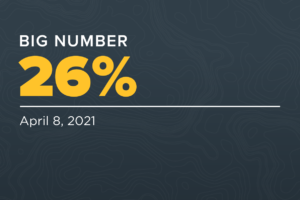
When financial markets went haywire in March 2020, people pursuing a traditional financial plan may have been tempted to do something…
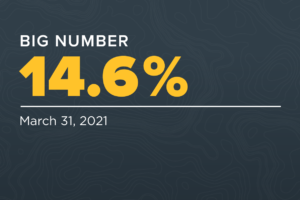
Of all the financial challenges facing retirees, being a widow can be one of the most difficult to bear. As the U.S. comes to the

Nearly every day the financial news headlines trumpet the selloff in bonds and the rising yields that go along with it. Some market pundits…

A common investor assumption is that bonds tend to go up in value when the stock market is sliding. That’s been true during the bond
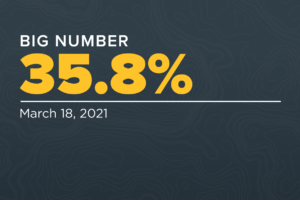
Like the famous Energizer Bunny, small-capitalization stocks keep on going versus their larger peers. Year to date, the S&P Small-Cap 600 Index is…
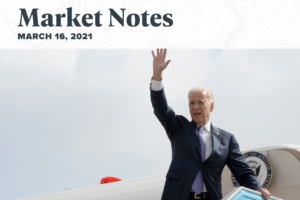
They’re very different Presidents, but what Joe Biden and Donald Trump have in common is their drive to make America’s economic growth rate…
On Wednesday, March 10, 2021, Scott Ladner, Horizon’s Chief Investment Officer, spoke with CNBC Pro’s Yun Li around the S&P 500’s record close as Biden
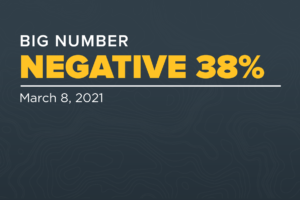
Does 2021 strike you as a replay of 1999? The investment theme now, as it was then, is to buy the companies on the leading

Many investors and financial advisors are still in the dark on what ESG factor investing means and how quickly the data behind this style of

A common investor assumption is that bonds tend to go up in value when the stock market is sliding. That’s been true during the bond

Federal Reserve chairman Jay Powell’s speaking engagement on March 4 is, in Horizon’s view, critical for the central bank’s messaging and…
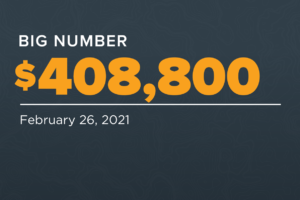
Up, up and away for the price of a new single-family home, which reached a record high $408,800 to kick off 2021. Goals-based clients who

Investors who are globally diversified may be seeing that pay off at the start of 2021. Emerging market (EM) stocks are ripping, up 8.2% year
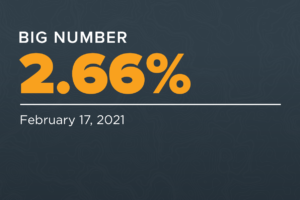
Inflation isn’t a problem now, but financial markets are saying it could be soon. Traders are pricing in the possibility that Consumer Price Inflation…

Here’s another knock against putting all of your retirement-income eggs in the bond market basket. This week is ushering in record low yields of…

A common investor assumption is that bonds tend to go up in value when the stock market is sliding. That’s been true during the bond
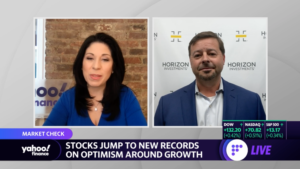
A common investor assumption is that bonds tend to go up in value when the stock market is sliding. That’s been true during the bond

A common investor assumption is that bonds tend to go up in value when the stock market is sliding. That’s been true during the bond

A record high for stocks…again. Earnings get much of the credit for the latest move. More than half of the S&P 500’s companies have reported

When stocks fall, bonds rally. That’s standard market action today. And it makes bonds look like a reliable way to counteract the stock market’s inevitable…
Follow us on: